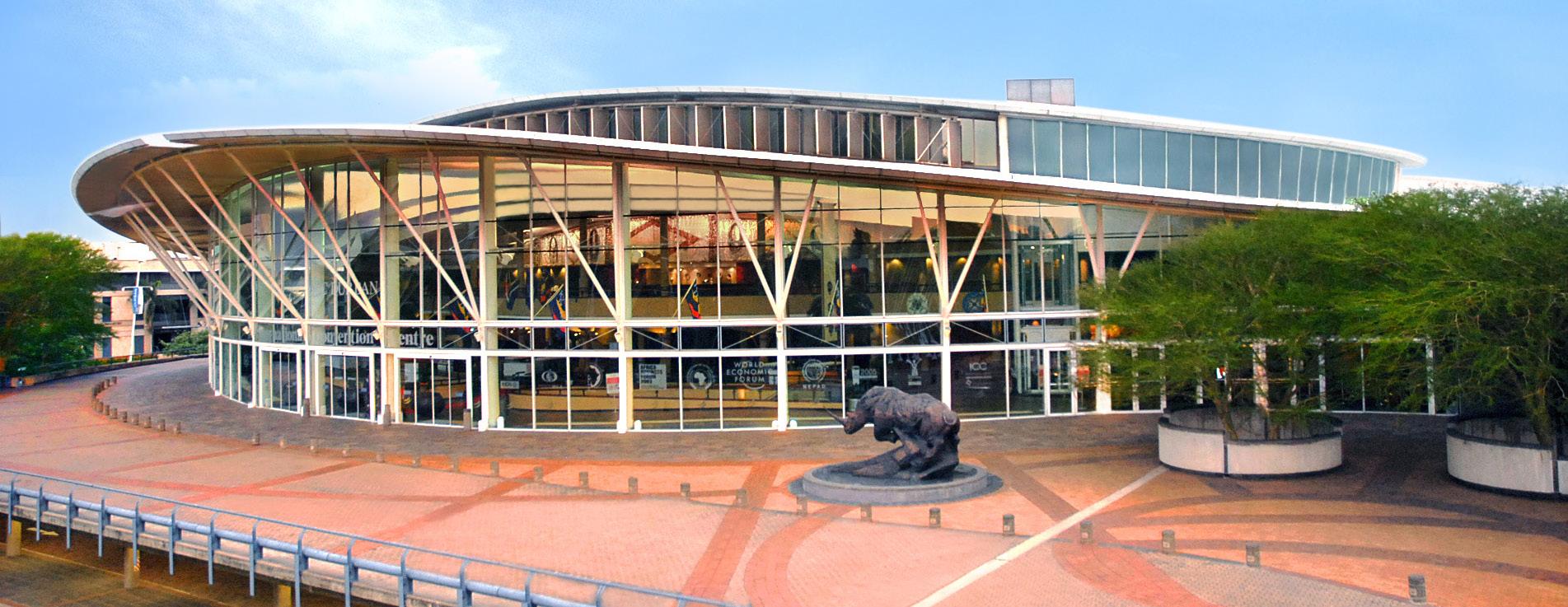








































The Durban Chamber of Commerce and Industry offers a wide variety of services to members, debates current issues through Standing Forums and advocates for business in the appropriate forums.
The Durban Chamber of Commerce and Industry NPC assists you in expanding your business globally by connecting you with international chambers around the world. This means that our members have complete access to international chambers of commerce and embassies, thus opening a world of possibilities and business opportunities internationally.
Through our International Business Unit, we produce Certificates of Origin (CO). A CO is a document required for all export processes to prove that the goods are from South Africa, the country of origin. We pride ourselves on being a reputable organisation that is respected in industry. Our CO business is governed by strict compliance guidelines and principles which ensure that every CO produced by the chamber for your product will be 100% vetted and compliant.
Through the Business Development division, the Durban Chamber of Commerce and Industry aims to support and transform small, medium and micro enterprises (SMMEs), including informal businesses in the Durban area, into sustainable businesses ready to do business with large entities. We offer non-financial assistance such as skills development, mentorship, networking workshops and oneon-one consultations.
Durban Chamber has been trusted by CIPC to be the agency that does most of the business legalities in KwaZulu-Natal such as company registrations, CIPC annual returns, name
changing, company amendments, directors’ amendments and company name reservations.
The Durban Chamber has more than 54 000 informal traders who receive assistance with their business needs through the associations they belong into. These businesses have a special membership package which is discounted to accommodate them. Just like SMMEs, they receive nonfinancial support such as skills development, mentorship, networking workshops and one-on-one consultations.
We continue to add value for our members through our robust interactions and partnerships with both the private and public sectors. These initiatives are over and above the numerous value-adding services offered by the chamber and our system of Standing Forums, which meet regularly to consider and debate relevant issues within the sectors that they represent. Our policy a nd advocacy initiatives ensure that we are constantly:
• Identifying government policies relevant to business in Durban and KwaZulu-Natal
• Informing, through research and giving a broader perspective and on such policies
• Liaising with relevant institutional structures to enhance robust collaboration
• Amplifying core issues that impact business with short, medium and long-term perspectives
• Promoting an appreciation of broad-based economic, social and environmental sustainability
• Advocating good practices to our members and enabling policy for the city, province and state
• Assisting in promoting partnership approaches to complex problematic issues affecting business

The Ethekwini Presidential Working Group has been established after a meeting between the Durban Chamber Of Commerce and Industry NPC and President Ramaphosa and five cabinet ministers.
As organised business, we remain committed to working with the government to rebuild Durban and create a favourable business environment. Our business is to serve the business community through advocacy and lobbying and to protect and promote the interests of the eThekwini business community.
The Durban Chamber of Commerce and Industry NPC, together with the KZN Growth Coalition, hosted President Cyril Ramaphosa on 23 February 2024 to discuss the issues affecting businesses in Durban and KwaZulu-Natal. The President was accompanied by a ministerial delegation comprising Ministers Gordhan, Cele, Mchunu, Ramokgopa and Zikalala. At the engagement business leaders discussed Durban’s dysfunctional infrastructure, tourism, promoting KZN as an investment hub and safety and security.
As an organisation, we believe this Working Group will provide an opportunity for the public and private sectors to engage. It is the first time since democracy that Durban business leaders have a direct line to the Office of the President. The Office of the President revealed that eThekwini Municipality accounts for 6.8% (the third-largest metropolitan municipality in South Africa) of the national population, 60.99% of the KwaZulu-Natal GDP and 9.7% of the national GDP.
We believe this is sufficient evidence that eThekwini Municipality is a significant economic contributor and critical metro for South Africa and therefore requires urgent attention. For the eThekwini Presidential Working Group to work and achieve its desired outcomes
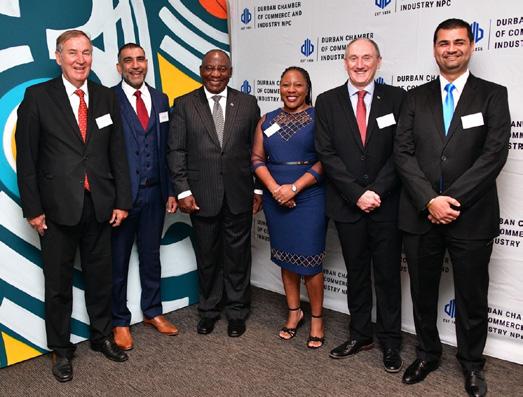
business needs to be allowed to lead in the following areas: infrastructure (water, sanitation, and energy distribution), safety and security, investment and tourism. These areas have been identified by the Durban Chamber of Commerce and Industry NPC as key pillars to help turn around eThekwini Municipality.
It is time for government and businesses to work together to solve Durban’s most pressing issues. If we do not address the challenges immediately, we can expect to see many businesses disinvesting from Durban and opting for alternative and more lucrative investment destinations. We need to save our city, and we need to do it now!
The Durban Chamber of Commerce and Industry NPC holds the distinction of being the oldest and largest metropolitan chamber in Africa, having been established in 1856. Our primary objective is to serve the business community in eThekwini by advocating and lobbying for their interests. Our organisation has a member-focused approach, ensuring that their needs are prioritised. We take pride in our brand, which is built on strong values, trust and integrity, making us the preferred choice of chamber for our members.
As the oldest metropolitan chamber in Africa, we are committed to delivering exceptional value to our members through our dynamic collaborations with the private and public sectors. Our efforts go beyond the vast array of value-added services that we provide. We have established a network of 20 Standing Forums that convene frequently to discuss and deliberate on pertinent matters within
their respective industries. By doing so, we ensure that our members are wellinformed and equipped to navigate the ever-evolving business landscape.
The Durban Chamber also offers membership. We believe in MEMBERSHIP THROUGH FELLOWSHIP and CREATING PARTNERSHIPS. Therefore RELATIONSHIPS are the true currency of commerce. The Durban Chamber facilitates our members’ development of business relationships with one another, as well as with other key stakeholders to promote economic growth.

The first shipment of goods under the under the African Continental Free Trade Area (AfCFTA) from the Port of Durban brought into sharp focus the urgent need for the province – and the country – to upgrade its ports and logistics infrastructure.
South African estates are offering more affordable properties, greener surroundings and a broader range of services and amenities.
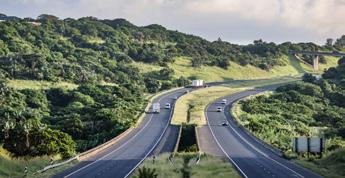
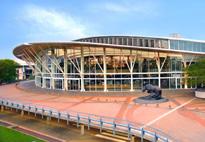
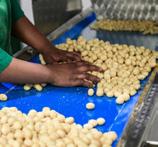

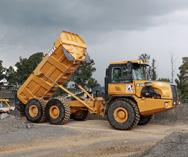
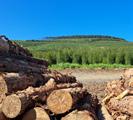
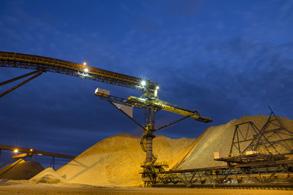




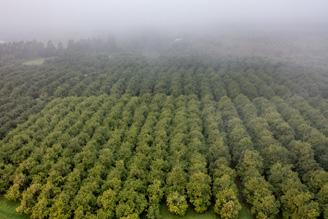

A unique guide to business and investment in KwaZulu-Natal.
Publishing director: Chris Whales
Editor: John Young
Managing director: Clive During
Online editor: Christoff Scholtz
Designer: Tyra Martin
Production:
Sharon Angus-Leppan
Project manager:
Chris Hoffman
Ad sales:
Shepherd Mugero
Sadiyah February
Dwaine Rigby
Gabriel Venter
Tahlia Wyngaard
Administration & accounts:
Charlene Steynberg
Kathy Wootton
Distribution and circulation manager: Edward MacDonald
Printing: FA Print
The 2024/25 edition of KwaZulu-Natal Business is the 16th issue of this highly successful publication that, since its launch in 2008, has established itself as the premier business and investment guide for the KwaZulu-Natal Province.
A special feature on the state of the estate market in South Africa notes some features beyond the obvious attractions such as security and coastal living. New factors in the growth of the estate living market include a focus on conservation and nature, developers offering a broader (and lower) price range for buyers of homes and residential estates now becoming part of bigger “precincts” offering other zones such as retail and commercial. Examples from KwaZulu-Natal are cited regarding these new trends.
The province’s ports, including the inland Dube TradePort situated at the King Shaka International Airport, were firmly in the spotlight as the first-ever shipment was made out of South Africa in terms of the African Continental Free Trade Area (AfCFTA). If the country is to take full advantage of the agreement then its logistics infrastructure has to run efficiently.
To complement the extensive local, national and international distribution of the print edition, the full content can also be viewed online at www.globalafricanetwork.com under ebooks. Updated information on KwaZulu-Natal is also available through our monthly e-newsletter, which you can subscribe to online at www.gan.co.za, in addition to our complementary business-to-business titles that cover all nine provinces, our flagship South African Business title and the latest addition to our list of publications, The Journal of African Business, which was launched in 2020. ■
Chris Whales Publisher, Global Africa Network Media
|
Email: chris@gan.co.za
KwaZulu-Natal Business is distributed internationally on outgoing and incoming trade missions, through trade and investment agencies; to foreign offices in South Africa’s main trading partners around the world; at top national and international events; through the offices of foreign representatives in South Africa; as well as nationally and regionally via chambers of commerce, tourism offices, airport lounges, provincial government departments, municipalities and companies.
Member of the Audit Bureau of Circulations

COPYRIGHT | KwaZulu-Natal Business is an independent publication published by Global Africa Network Media (Pty) Ltd. Full copyright to the publication vests with Global Africa Network Media (Pty) Ltd. No part of the publication may be reproduced in any form without the written permission of Global Africa Network Media (Pty) Ltd.
PHOTO CREDITS | AES; Afrimat; Bel Adone/Wikimedia Commons; Bell Equipment; Coastlands Hotels and Resorts; Dube TradePort; Durban Chemicals Cluster; GCIS; Mondi; Old Mutual; Renishaw Coastal Precinct; Riverside Precinct; St Francis Links Villas; SAPREF; SCTIE;
Global Africa Network Media (Pty) Ltd
Company Registration No: 2004/004982/07
Directors: Clive During, Chris Whales
Physical address: 28 Main Road, Rondebosch 7700
Postal address: PO Box 292, Newlands 7701
Tel: +27 21 657 6200 | Fax: +27 21 674 6943
Email: info@gan.co.za | Website: www.gan.co.za
Estate.
DISCLAIMER | While the publisher, Global Africa Network Media (Pty) Ltd, has used all reasonable efforts to ensure that the information contained in KwaZulu-Natal Business is accurate and up-to-date, the publishers make no representations as to the accuracy, quality, timeliness, or completeness of the information. Global Africa Network will not accept responsibility for any loss or damage suffered as a result of the use of or any reliance placed on such information.
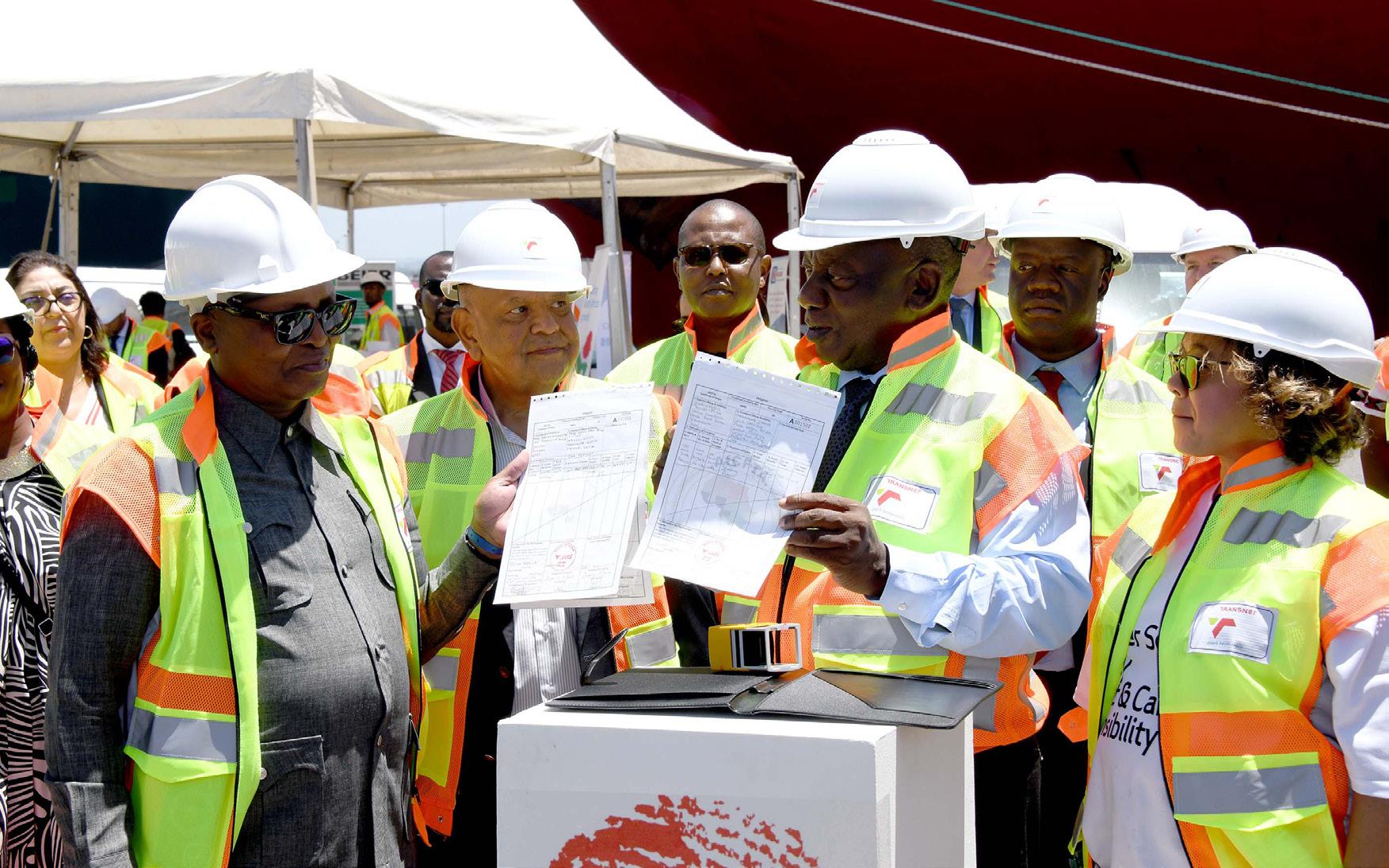
The first shipment of goods under the under the African Continental Free Trade Area (AfCFTA) from the Port of Durban brought into sharp focus the urgent need for the province – and the country – to upgrade its ports and logistics infrastructure.
By John Young
In January 2024 President Cyril Ramaphosa was on hand to oversee the first goods leave South Africa from the Port of Durban under the African Continental Free Trade Area (AfCFTA), the agreement whereby most African countries will trade with one another with greater freedom.
Unlike other continents where intra-continental trade has boosted economic growth, exports between African countries is at about 16%. Asia is 55%, North America 49% and the EU 63%.
The first steps in a move by national government to partner with the private sector in boosting efficiency at ports were taken in 2022: deals were signed at the Port of Durban and at Richards Bay.
In 2023, these first steps became a giant leap when International Container Terminal Services
Inc (ICTSI), a Philippines-based port operator, was announced as the preferred partner for a joint venture (JV) to run the Durban Container Terminal with Transnet. Getting the deal over the line might take longer as logistics giant Maersk has lodged objections over the process.
ICTSI operates in 20 countries and employs more than 11 000 people. Transnet will hold 50% plus one share in the JV for 25 years, with an option to extend to 30 years. From the initial list of 17 potential partners, ICTSA was eventually chosen from a shortlist of six. Part of the plan for Durban Container Terminal Pier 2 is to increase traffic in such a way that it will be able to increase its handling capacity from the present 2.9-million TEUs (twomillion 20-foot equivalent units) to 11-million TEUs by 2032.
PHOTO: GCIS
The 2022 deal involving a 15-year concession for the loading of grain at one of Durban’s agricultural terminals was won by Afgri, one of South Africa’s biggest agricultural firms. Afgri will deal with the operation and maintenance of all landside operations, and the deal includes a similar arrangement at East London. The other two terminals in Durban are operated by SA Bulk Terminals and Bidvest Bulk Terminals.
At the event, pictured, President Ramaphosa commented, “Industrial development is core to Africa’s integration. It builds Africa’s productive capacities, adds greater value to our products and diversifies trade beyond the traditional commodities. We have already seen the potential of greater cross-border collaboration.
“South African automotive companies source leather car seats from a factory in Lesotho employing close to a thousand workers and wiring harnesses from Botswana at two plants employing several thousand workers.” He further noted that copper wire is sourced from Zambia, rubber from Cote d’Ivoire, Nigeria, Malawi, Ghana and Cameroon, and steering wheel components from Tunisia.
Ramaphosa’s attendance at another event signalled that there is sincere interest in the upgrading of logistics infrastructure. The President returned to Durban in April 2024 to officially launch the Newlyn PX Bayhead rail terminal. The multimodal hub will handle, store and make possible the loading and movement of many kinds of cargo, including containers. The facility is adjacent to the Port of Durban.
KwaZulu-Natal’s two big original equipment manufacturers (OEMs), Toyota South Africa and Bell Equipment, are among the province’s biggest exporters. From its factory south of Durban Toyota exported 71 014 Hilux vehicles in 2023, to go with the 37 382 units of the same model that it sold locally.
About 40% of Bell Equipment’s South African turnover is accounted for by exports, which are sent to more than 80 countries. The company has a large plant in Richards Bay as well as a facility in Germany. Bell was the first winner, in 2019, of the Exporter of the Year Awards for capital equipment
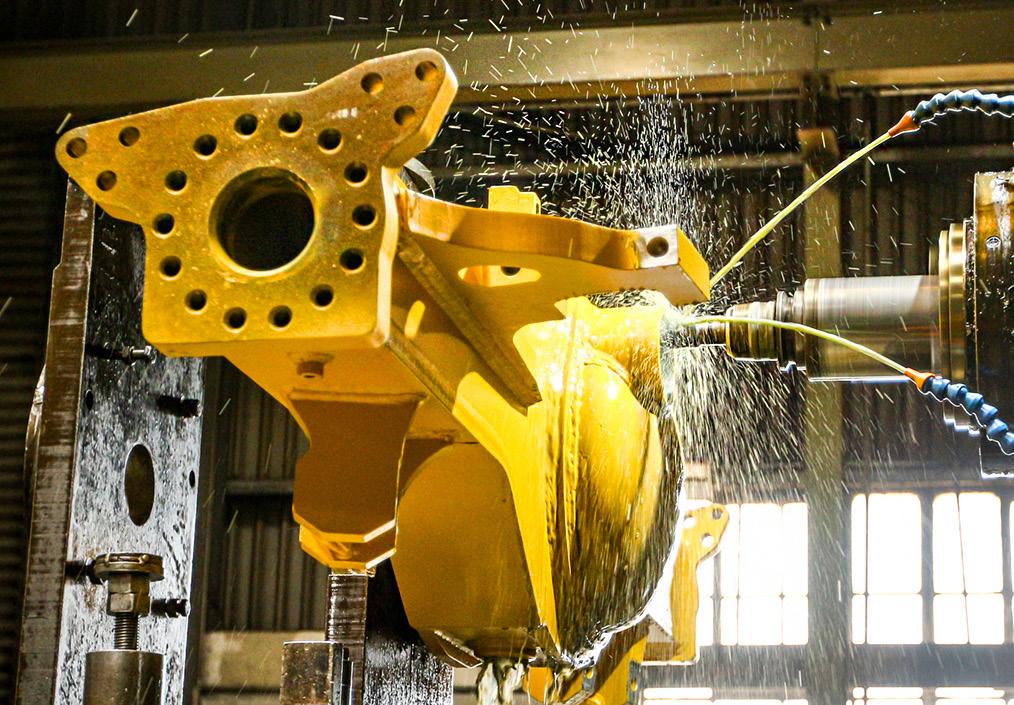
Bell Equipment has launched a new division, Bell Heavy Industries.
manufacturers offered by the South African Capital Equipment Export Council (SACEEC).
In 2023, Bell launched a new division, Bell Heavy Industries. Project engineering and contract manufacturing will be the focus of the division, which builds on seven decades of experience in complex engineering, heavy fabrication, and machining for its own range of material handling equipment. In 2024, the company welcomed a new Group CEO. Having previously worked at the company his grandfather Irvine Bell founded in 1954, Ashley Bell co-founded Matriarch Equipment with his brother, Justin Bell, in 2009, and continued to act as a director of Bell from 2015. One of the first tasks of the new CEO was to announce that a new Bell Motor Grader would be manufactured at the Richards Bay plant from 2025.
The Provincial Government of KwaZulu-Natal has created a KZN Energy War Room. Over and above the interventions into energy efficiency of government buildings and investments in things like solar panels, and plans to continue rolling out electricity connections to previously unserviced households, the administration intends turning Richards Bay into an energy hub.
This ambition received a boost in 2023 with the decision by the National Energy Regulator of South Africa to approve Eskom’s application to build a 3 000MW gas power station at Richards Bay.
Battery storage has made a debut in the province as well. South Korean firm Hyosung Heavy Industries has signed on to implement the Eskom project to create a battery energy storage system, in this instance in the uMgungundlovu District Municipality.
PHOTO: Bell Group

Every kind of business is turning to renewables. The Creighton Valley Cheese Company has been solar-powered since 2020.
In 2023, Premier Nomusa Dube-Ncube said that, in addition to the R97-billion Eskom project, the following facilities would be established at the deepsea port:
• Mabasa Energy and Fuels, R10-billion
• NFE BGE Gas Supply, R25-billion
• Phakwe RBGP, R34-billion
An earlier announcement on the energy front by President Ramaphosa that private investors could generate up to 100MW without having to go through a tangled web of licence procedures was a boon for the province’s larger companies. The likes of Sappi and Mondi produce great quantities of biomass waste and all of the province’s sugar producers are potentially generators of electricity.
Many of them already are producing power for their own use, now they can sell it to the grid.
The signing of a long-term contract for energy supply by Eskom and South32 for its Hillside Aluminium smelter was another very welcome step in the energy field. The deal expires in 2031.
In the oil and gas sector, the big issue of SAPREF, South Africa’s largest crude oil refinery which suspended operations in 2022, has been solved in the sense that the Central Energy Fund has purchased it. However, whether it will return to refining oil is an open question.
The province’s existing infrastructure, good soils and fine weather provide a solid base for a varied economy. KwaZulu-Natal has significant capacity in heavy and light manufacturing, agro-processing and mineral beneficiation, all of which is supported by South Africa’s two busiest ports (Richards Bay and Durban), the country’s most active highway (the N3), a modern international airport and pipelines that carry liquids of all types to and from the economic powerhouse of the country around Johannesburg in the interior.
Mondi and Sappi, two global giants in forestry, paper and packaging, have a significant presence in KwaZulu-Natal.
Tourism is a key sector in the KwaZulu-Natal economy and provides livelihoods to many thousands of families in urban and rural areas. The closing of borders brought real hardship to many areas.
A number of flights have been resumed to King Shaka International Airport by the likes of Turkish Airlines and a new flight has been inaugurated by SA Airlink, connecting the province to Zimbabwe.
The provincial government is working on an investment pipeline, through the Special Economic Zones (SEZs), of R22-billion. The SEZs at Richards Bay and King Shaka International Airport (the Dube TradePort) are key components of the strategy and are now well-established nodes of investment.
Milestones have been reached in the plan for creating further SEZs to focus on leather and textiles. A business case has been completed by units within the provincial government and land at Ezakheni (Ladysmith) in the uThukela District has been identified and secured. Dube TradePort will be the SEZ operator and R780-million in investments has been pledged by companies keen to relocate to the SEZ. To spread the benefits of the SEZ, the concept of “The Textile Belt” will be followed. The corridor approach will leverage comparative advantages of various regions in the clothing and textile value chain. ■

MIYELANI MKHABELA
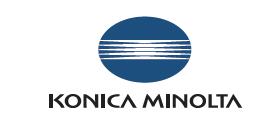
Group Chief execu.ve
: +27 61 443 3199
Service excellence and class-leading brands – exceeding expectations.
: www.antswisa.co.za
: The Firs of Rosebank, Biermann Ave, Rosebank, Johannesburg, Gauteng 2196
Sir/Madam,

DATE:
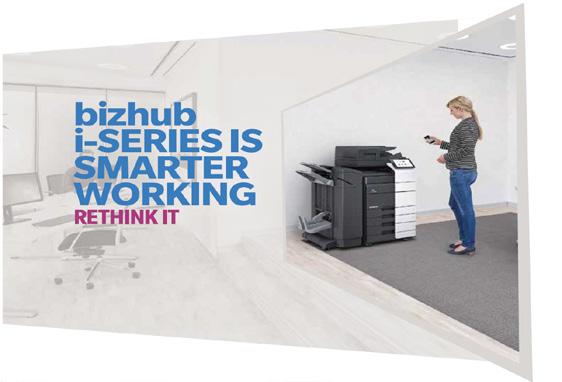
Develop Office is a wholly owned dealership distributor of leading stationery brands. Our diverse range of quality products enables us to service all related such as the office, schools, homes and corporates within and beyond our borders. Our national sales and distribution network is supported by in Johannesburg, Durban, Cape Town and East London as sales branch in Polokwane and Nelspruit. These hubs cover all regions and regional centres across the and beyond our borders into Africa. Our experienced team is dedicated to service excellence and to long term relationships with our customers.
Antswisa Develop Office, we are extremely proud of the class-leading international brands for which we have distribution rights. Our wholesale dealership brands include: Croxley, Dahle, Durable, Dymo, Esselte, Jovi, Leeho, Leitz, Lion Brand, Maped, Papermate, Parker, Pendaflex, Penguin, Rapid, Rolodex, Rotring, Talens, Sellotape, Sharpie, Stabilo, Twinlock, Thrass, UHU, Konica Minolta Printing Machines and Waterman.
means continuous improvement and innovation in retail markets, and We remain committed to our of providing world class product at competitive prices with a focus on customer service excellence.

AAntswisa Develop Office we measure ourselves on our ability to deliver a service level that meets and exceeds expectations. In the recent months we have invested great amounts of time and resource in improving our and processes We always welcome any input to improve our service to you.
committed to our promise of providing world-class product at competitive price with a focus on customer service excellence.
you for your continued support and looking forward to a mutually beneficial relationship into the future.
ntswisa Develop Office, a wholly owned subsidiary of Antswisa Group, is a wholesale dealership and distributor of leading stationery brands.
Our diverse range of quality products enables us to service all related markets such as the office, schools, homes and corporates within and beyond our borders.
Our national sales and distribution network is supported by regional hubs in Johannesburg, Durban, Cape Town and East London as well as sales branches Polokwane and Nelspruit. These hubs cover all regions and regional centres across the country and beyond our borders into Africa.
+27 61 443 3199
miyelani.antswisa@icloud.com
Our experienced team is dedicated to service excellence and to building long-term relationship with our customers.
www.antswisa.co.za
At Antswisa Develop Office we measure ourselves on our ability to deliver a service level that meets and exceeds your expectations. In recent months we have invested great amounts of time and resources in improving our systems and processes.
We always welcome any input to improve our service to you.
BIZHUB 550I
Simple, Connected and Safe
The Firs of Rosebank, Biermann Ave, Rosebank, Johannesburg, Gauteng 2196
At Antswisa Develop Office, we are extremely proud of the class-leading international brands for which we have exclusive distribution rights.
Our wholesale dealership brands include Croxley, Dahle, Durable, Dymo, Esselte, Helix, Jovi, Leeho, Leitz, Lion Brand Maped, Papermate, Parker, Pendflex, Penguin, Rapid, Rolodex, Rotring, Royal Talens, Sellotape, Shapie, Stabilo, Twinlock, Tharss, UHU, Konica Minolta printing machines and Waterman.
Antswisa means continuous improvement and innovation in the retail markets, and we remain
• Black & white A4/a3:55/27 ppm
• Paper formats: A6-SRA3, custom formats banner format up to 1.2 metres
• 10.1-inch colour panel with multi-touch support and dedicated mobile touch area provides more convenience and flexibility
• Reduced environmental impact thanks to state-of-the-art technology that ensures competitively low energy consumption, which also saves money
• Highest data security with various security functionalities including state-of-the-art antivirus technology that reduces the risk of data loss and keeps confidential data safe!
South African estates are offering more affordable properties, greener surroundings and a broader range of services and amenities.

Estate living continues to grow as a trend, but estates themselves are changing.
A Pam Golding Properties analyst told Property24 in 2023 that 16.4% of all residential sales in South Africa in the previous year were for properties in estates. The figure for 2010 was 13.1%.
Property research company Lightstone has put the number of estates in South Africa at 5 000, encompassing about 440 000 properties. This is only 7% of the country’s property portfolio but represents about 17% of the total market value of residential property.
The Covid-19 epidemic is part of the reason for the uptick in numbers and the rise in remote working is a related factor but there are other considerations: increasing demand for security and the attractions of a coastal lifestyle compared to inland living among them.
Three other shifts are noticeable:
• the importance of wildlife and nature in new estates
• the broader scope of affordable options available
• the widening of the concept of estate living to include “precincts”
New World Wealth’s analysis of trends in estates in 2021 noted a “general movement away from traditional golf estates and towards wildlife and parkland estates” and stated that clustering of housing was becoming commonplace in order to allow for more open space on the estate as a whole.
Something else noted by this survey was that the percentage of millionaires living in (or having a second home on) estates was on the rise, up from 30% in 2010 to 48% at the time of the survey, June 2021.
Adrian Gardiner, founder of the Mantis Collection, says of the St Francis Links estate, inside of which his company has recently developed the St Francis Links Villas, “The birdlife and the wildlife make St Francis unique.”
The first page of the website of KwaZuluNatal’s Zimbali Estate references a “natural and contemporary coastal forest estate”, “eco-friendly”, “caring for the environment” and “our wildlife, our birdlife and our incredible flora”.

Excellent
Lightstone regularly releases graphs showing trends in the property market. The average price for an estate property in 2003 was close to R3-million. That figure averaged just less than R2-million in the four years to 2022.
The St Francis Links Villas in the Eastern Cape is a typical new development in that it includes free-standing houses but also one-bedroom and two-bedroom apartments.
Newer estates are also allowing for smaller plots and greater mix of more affordable houses to be built. This might be within a particular section or “suburb” of the estate, as with the St Francis Links Villas option, which is a development within the estate. Residents of the Villas have some of their own amenities (like healthcare) but they also have access to the clubhouse and gym of the main estate.
A new trend in estate living is the move to precincts. Essentially this is the extension of the concept of a secure estate to encompass more elements: residential, commercial, educational, medical and recreational. In short, a town within a city with the residential estate occurring within the precinct.
An established practice is to have hotels or lodges within the estate, as is the case at Zimbali. The idea of a precinct goes beyond holidaying and recreation to encompass work and play.
Gideon van der Vyver, the developer of the Riverfields Precinct in Gauteng, says that the focus is on safety, sustainability and community. Calling the new entities “managed precincts”, Van der Vyver points to the success of the Umhlanga Urban Improvement Precinct (UUIP) which was established in 2015. He credits the UIP with
reducing crime, improving street cleanliness and creating a more welcoming environment. Other examples he cites from around South Africa are Waterfall City (between Johannesburg and Pretoria), Melrose Arch and Steyn City in Johannesburg, the V&A Waterfront and Century City in Cape Town and Menlyn Maine in Pretoria.
Riverfields, which is near the OR Tambo International Airport, has so far delivered more than 1 000 residential units, a retail node is functioning and a number of logistics and distribution centres have been created in the light industrial zone.
While the KwaZulu-Natal North Coast has long been a site for golf and residential estates, many destinations south of Durban are proving attractive destinations for people choosing estate living.
One of the most ambitious of these is the 1 300-acre Renishaw Coastal Precinct on the Mid-South Coast near Scottburgh. The development is backed by Renishaw Property Developments, a subsidiary of the JSE-listed Crookes Brothers Limited, and its property partner, Crocker Properties.
At Renishaw Hills, an established retirement estate which is the first node to be completed, every property has been positioned to maximise the views of the surrounding coastal forest and Indian Ocean.
The precinct will eventually comprise zones for residential, retail, educational and healthcare. In keeping with the latest trend, the developers will build on just 20% of the land, creating a conservation area of real substance.
Van der Vyver sums up the positive impact a managed precinct can have as follows: “They attract businesses, tourism and investment, which leads to job creation and increased economic activity. The presence of commercial spaces and retail outlets also generates revenue for the local government through taxes and fees.” ■


Renishaw Managing Director Barto van der Merwe believes that his company’s latest all-inclusive offering for residents and investors will enhance the attractiveness of the KwaZulu-Natal Mid-South Coast.

Renishaw Managing Director
Barto van der Merwe.
Barto van der Merwe is an accomplished Managing Director with extensive experience in the construction industry. He holds a Bachelor of Engineering in Structural Engineering from Technological University Dublin and is recognised as a Chartered Engineer in Ireland and a Professional Engineer in South Africa. Skilled in structural and building engineering management and in corporate leadership, Barto is also a strong community and socialservices professional, bringing a wealth of knowledge and leadership to his role.
Where is the Renishaw Coastal Precinct?
The 1 300ha Renishaw Coastal Precinct falls within two municipalities: eThekwini in the north and Umdoni in the south. It’s located in the KwaZulu-Natal Mid-South Coast on prime land adjacent to the ocean, just 45 minutes from King Shaka International Airport and with access to the N2.
What is your vision for Renishaw Coastal Precinct?
Our vision is to enhance the Mid-South Coast through strategic land sales that provide essential community facilities such as hospitals, schools and shopping centres. Our focus is community development over profit, which means creating symbiosis with the existing community. Our pending donation of 142ha of adjacent land to the community of Amandawe under the KwaCele Tribal Council (KTC) and the 10% stake in the development company will be acquired by the KTC through a buy-out process to ensure community inclusivity and prosperity.
How is Renishaw Coastal Precinct different from other developments?
At Renishaw Property Developments, a proud subsidiary of the JSE-listed Crookes Brothers Limited, we prioritise the conservation of the region’s natural beauty. Our development spans an impressive 1 300ha, but unlike other projects that cram as many units as possible into small spaces, we are dedicated to preserving the land.
Only 20% of our property will be developed, with the remaining 80% transformed into a stunning conservation area. This approach creates one of South Africa’s largest and most unique developments, offering a harmonious blend of modern living and nature. With our deep historical ties to the region, we’re committed to building a community that embodies sustainable luxury and unparalleled quality.
Our vision is to create a self-reliant, sustainable commuter development that offers significant investor advantages. With a prime location, subtropical climate, competitive property prices, secure water provision and sanitation, on-site healthcare and education and comprehensive zoning, we’re attracting investors who share our vision for inclusive community development.
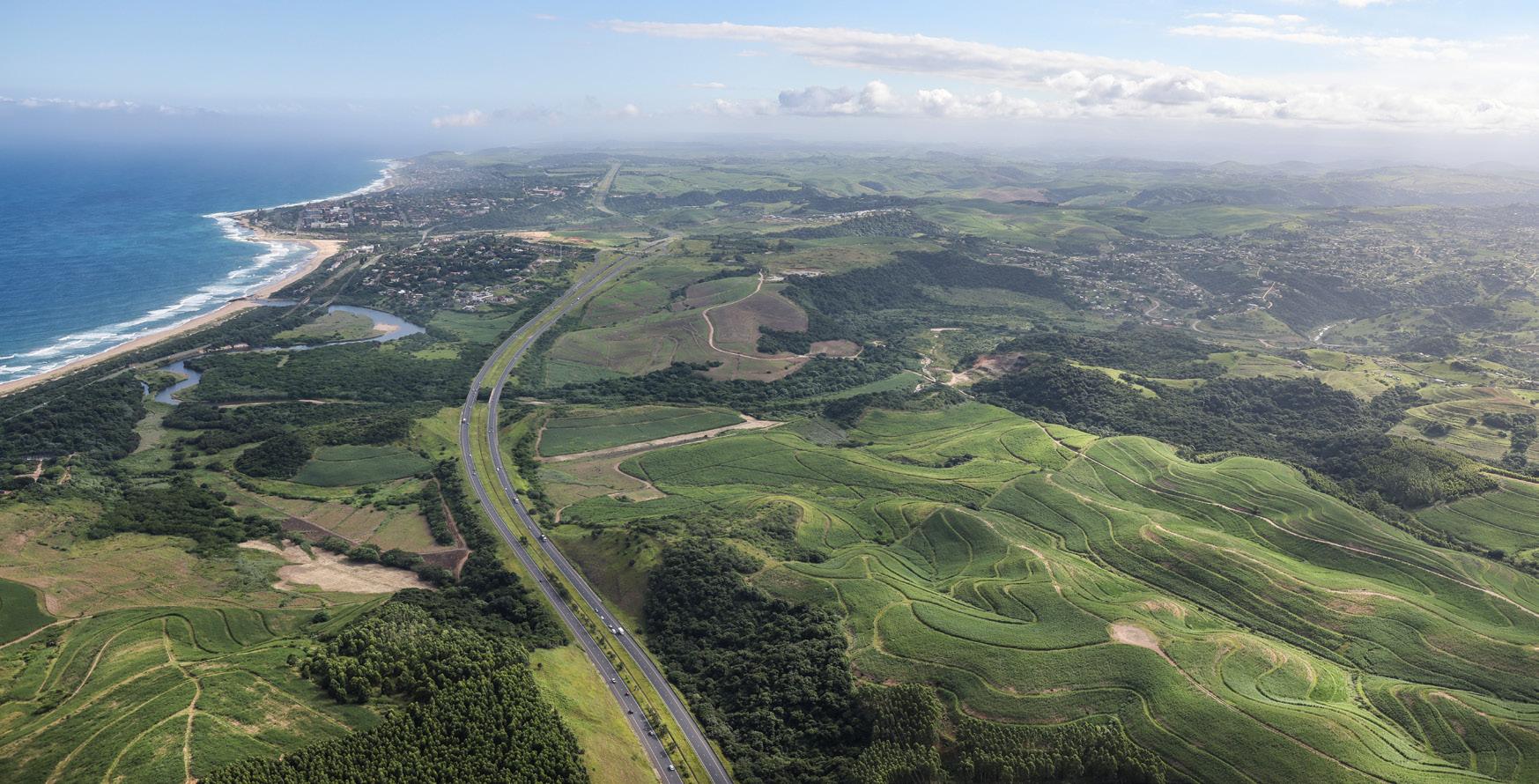
Why was Renishaw Hills mentioned at the 5th South Africa Investment Conference (SAIC) in 2023?
Renishaw Hills, a mature lifestyle estate and the first development within the Renishaw Coastal Precinct, represents R500-million of an anticipated R15-billion investment. As part of Node 1 in a five-node precinct, it promises significant socio-economic benefits. With 2 500 residential opportunities for 7 500 people and thousands of jobs, the precinct was recognised by President Cyril Ramaphosa for its investment pledge at the 2023 South Africa Investment Conference.
Is Renishaw Hills sold out or are stands available?
Phase 5 is completely sold out and the most recent section, Phase 6, is already 70% sold out, with its highend free-standing units and maisonettes in demand. The highly anticipated apartments are launching in 2024, with Phase 7 set to dazzle in 2025, providing further investment opportunities in this quality estate for those over 50. We encourage interested parties to visit www.renishawhills.co.za to book a tour now.
Who is attracted to Renishaw Coastal Precinct?
The semigration trend has seen residents from KwaZulu-Natal and Gauteng investing in Renishaw Hills, with ex-pats returning to the region to take advantage of the affordability, quality lifestyle, subtropical climate and high-end amenities. The buyto-rent market is also strong with younger investors buying in Renishaw Hills enjoying great rentals with a long-term vision of living here. The precinct is attracting interest from reputable organisations, who
share our vision for a development that enhances the entire KZN Mid-South Coast. This includes a local company building the filling station, a respected school group that will establish the region’s first private school, a renowned hotel chain and developers of a shopping centre that have invested, with a wellknown church group currently finalising a deal.
What are the key attractions of the area?
The KZN Mid-South Coast is renowned for its laidback outdoor lifestyle and boasts several seaside attractions. Scottburgh Beach is ideal for swimming, surfing and sunbathing and there are world-class dive sites – the nearby Aliwal Shoal and further south, Protea Banks. There are many great golf courses, hiking and biking trails, nature reserves as well as community events that take place throughout the year. ■
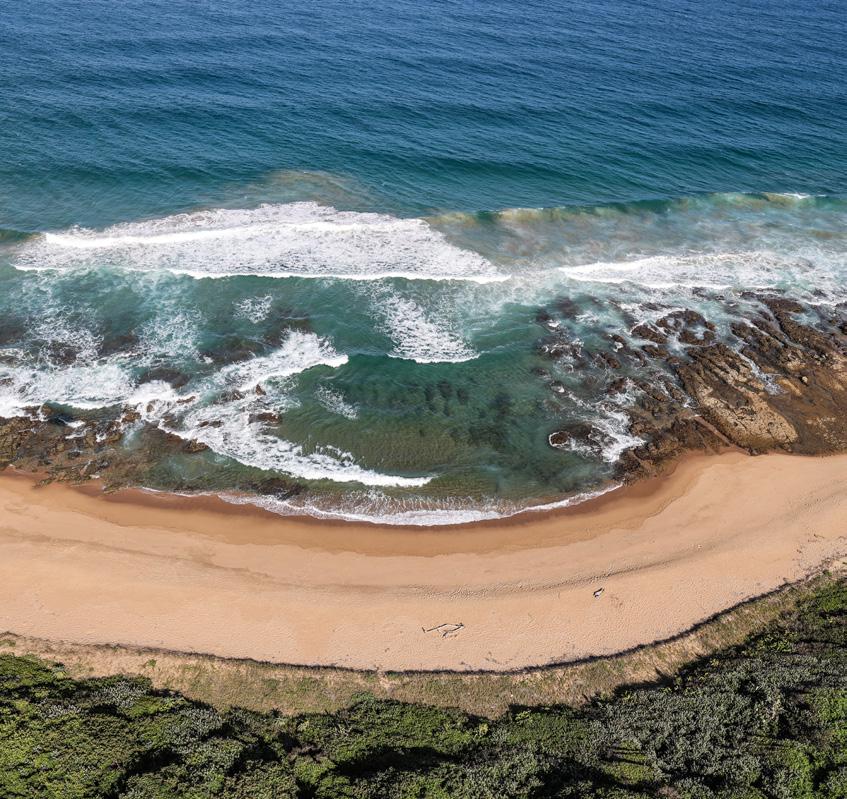
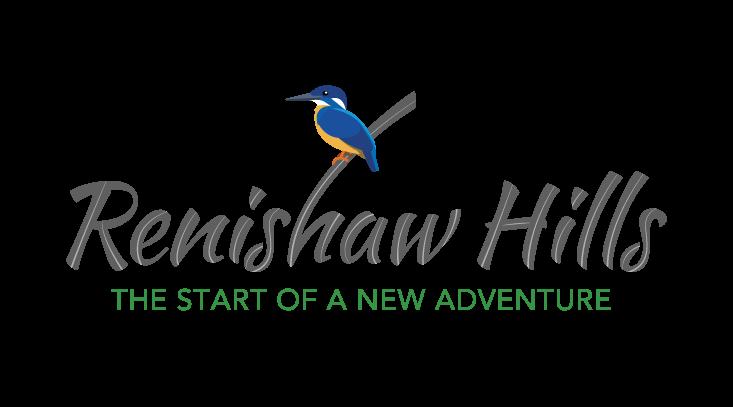
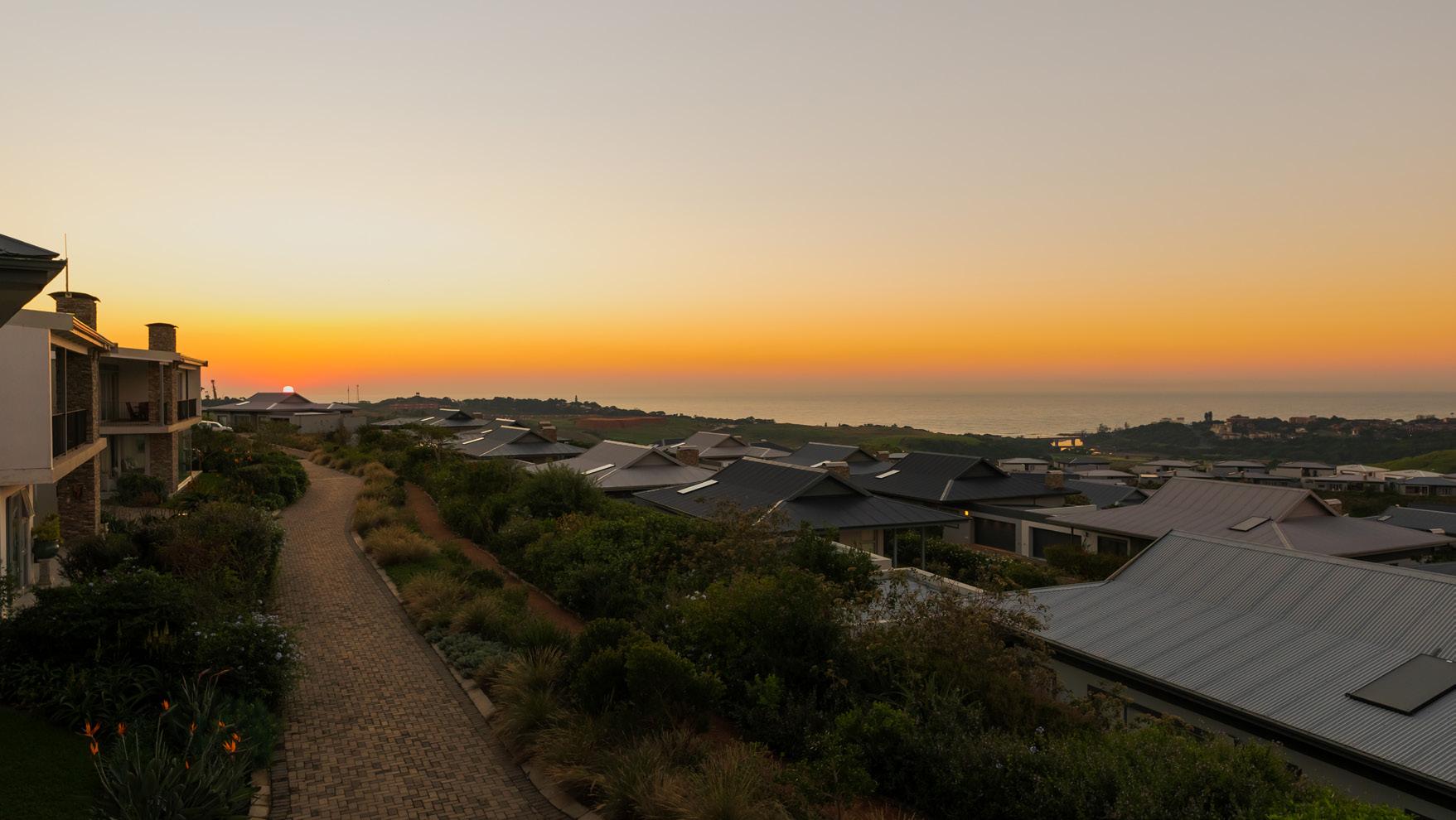
Your endless holiday at Renishaw Hills
Welcome to Renishaw Hills, the over-50s oasis by the sea. Set in KwaZulu-Natal’s Mid-South Coast town of Scottburgh, the estate provides community, security, superior healthcare and affordability.
Renishaw Hills is a prime investment destination, offering discerning buyers high-quality properties at competitive prices. This prestigious 25-hectare lifestyle estate has delivered exceptional investment returns. In just six years, property values have soared by 60%, with demand for these upscale units continuing to rise.
Renishaw Hills is part of Renishaw Property Developments, a subsidiary of the JSE-listed Crookes Brothers Limited. It’s the first development in the expansive 1 300-hectare Renishaw Coastal Precinct, with R500-million already invested and an estimated R15-billion likely to be achieved upon completion. As the pioneering project among five interconnected nodes in this mixed-use, self-sustaining precinct, Renishaw Hills is setting a new standard. Its remarkable contribution to investment has even garnered special mention from President Cyril Ramaphosa at the 5th South Africa Investment Conference.
More than 200 residential units have been sold in Renishaw Hills, with an ambitious vision to offer 2 500 residential opportunities across the entire Renishaw Coastal Precinct, ultimately providing homes for around 7 500 people. Development opportunities have been sold to renowned organisations, with deals for a shopping centre and filling station already
finalised while agreements for the first private school, hospital, church and hotel are on the horizon.
Community development lies at the heart of this visionary project and all investors are reputable and aligned with this ethos. The result is a thriving, vibrant precinct setting a new benchmark for lifestyle living on the Mid-South Coast.
A deep commitment to nature lies at the heart of Renishaw Hills, with extensive land, including a vibrant wetland, undergoing remarkable rehabilitation. Residents revel in the natural beauty and year-round subtropical climate as they explore hiking and biking trails with breathtaking ocean views. This passion for nature extends throughout the Renishaw Coastal Precinct, where 80% of the land is being preserved for conservation, creating an unparalleled coastal haven.
Investors in Renishaw Hills become part of an allinclusive estate that provides peace of mind with cutting-edge security. An electric perimeter fence, camera surveillance, access control and 24/7 guarding and patrols ensure residents’ safety while remaining
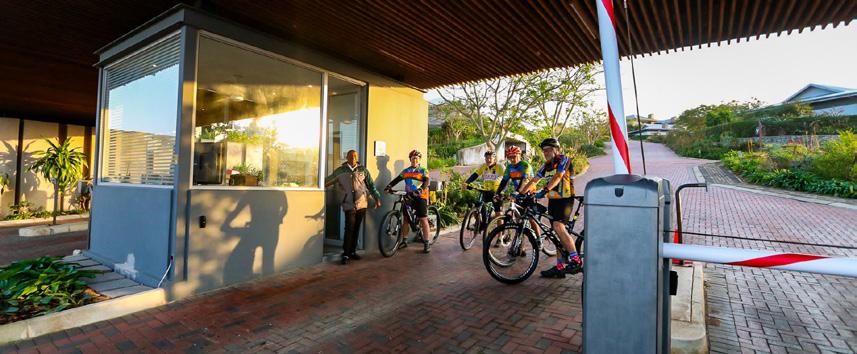
unobtrusive. Here, you can truly relax and embrace the good life, knowing that you’re protected by the best security measures available.
Residents enjoy the freedom to indulge in the estate’s countless social activities and top-class facilities. Enjoy a dip in the heated swimming pool, stay fit in the gym or relax in the library. Join in on boules, archery, snooker, art, dancing, darts, mah-jong, canasta, cycling, walking, bridge, the book club, the camera club, table tennis… and so much more! The list is virtually endless!
Renishaw Hills champions physical well-being through its vibrant, active outdoor lifestyle, but the estate also boasts on-site healthcare to meet every resident’s health needs. The Renishaw Hills Estate Medical Service, operated by Senior-Care, provides a dedicated, 24-hour medical response as well as a telephonic advisory service. Residents can also enjoy home-based care, which offers personalised assistance in the comfort of their own homes, an internationally preferred method of senior care.
Residents of this pet-friendly estate enjoy uninterrupted water supply thanks to borehole water treated on-site to SANS 241 standards. Each Renishaw Hills unit is equipped with solar geysers, inverters, prepaid meters and premium fittings like SMEG gas hobs and electric ovens. It’s a perfect blend of sustainability, luxury and style.

Renishaw Hills’ Reversionary Transfer Obligation (RTO) units offer a unique investment model similar to life rights. You gain secure, lifelong occupancy at a much lower market price and at this attractive price point they are sold very quickly which means getting in early.
The estate offers exceptional value for money with affordable levies starting at just R2 340 for apartments. This all-inclusive fee covers everything: exterior maintenance and insurance, garden services, refuse collection, postal services, fibre-optic WiFi, security, healthcare options and access to communal facilities. Homeowners can enjoy a worry-free lifestyle with all the essentials taken care of!
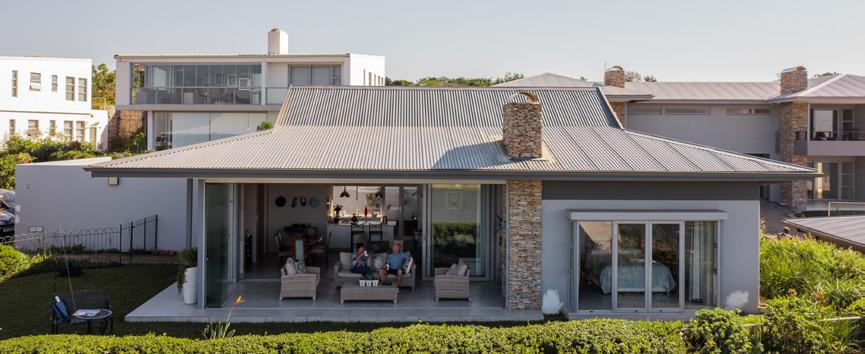
At Renishaw Hills, no corners have been cut. The estate was crafted using only the finest building materials and by partnering with renowned architects and accredited construction companies. By prioritising impeccable quality and design, contractors have won multiple Excellence in Construction awards. Investors can rest easy, knowing their homes are built to last, free from the worry of unforeseen and costly repairs.
Nestled in the vibrant coastal town of Scottburgh, Renishaw Hills offers easy access to shopping centres, restaurants, golf courses, stunning conservation areas and warm beaches. Just a stone’s throw away is the renowned Aliwal Shoal, a Marine Protected Area and one of the world’s top dive sites, teeming with marine life and underwater adventure.
The warm climate supports an outdoor lifestyle, with magnificent trails for avid runners and cyclists. Renishaw Hills has everything a mature resident needs to fully embrace this lifestyle. Birdwatching is a delight with countless bird species waiting to be sighted!
Each Renishaw home features a professionally installed indigenous garden worth in the order of R200 000, designed by renowned botanist Elsa Pooley. This tranquil retreat lets you relax, unwind, and connect with nature without ever leaving home. Visit
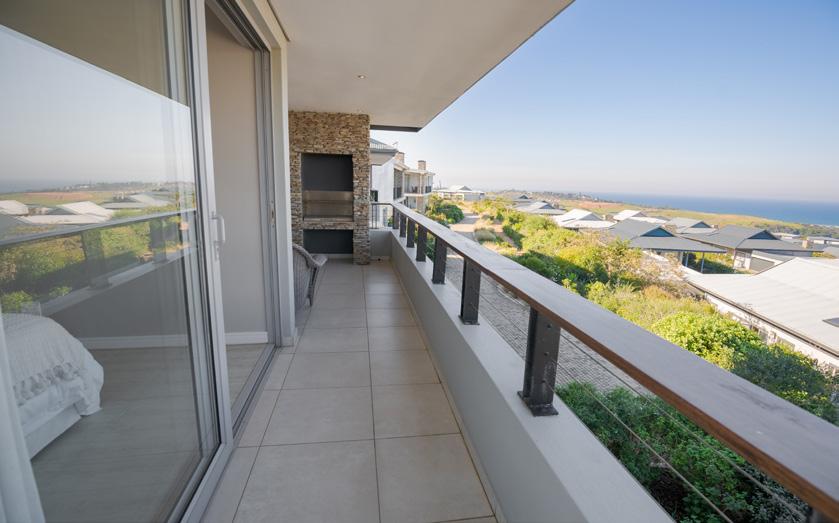
Secure your slice of paradise today!
Renishaw Hills offers freestanding units, maisonettes and apartments with stunning ocean and forest views. Apartment prices start at just R1 595 000, 2-bedroom maisonettes from R2 050 000 and 2-3 bedroom houses begin from only R2 280 000 – all with no transfer duties payable.
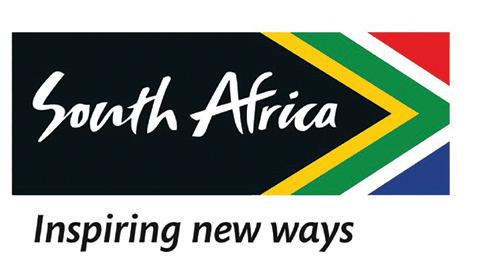

Growing middle class, affluent consumer base, excellent returns on investment.
SA is the location of choice of multinationals in Africa. Global corporates reap the benefits of doing business in SA, which has a supportive and growing ecosystem as a hub for innovation, technology and fintech.
South Africa (SA) has the most industrialised economy in Africa. It is the region’s principal manufacturing hub and a leading services destination.
SA has a progressive Constitution and an independent judiciary. The country has a mature and accessible legal system, providing certainty and respect for the rule of law. It is ranked number one in Africa for the protection of investments and minority investors.
The African Continental Free Trade Area will boost intra-African trade and create a market of over one billion people and a combined gross domestic product (GDP) of USD2.2-trillion that will unlock industrial development. SA has several trade agreements in place as an export platform into global markets.
SA has a sophisticated banking sector with a major footprint in Africa. It is the continent’s financial hub, with the JSE being Africa’s largest stock exchange by market capitalisation.
SA is endowed with an abundance of natural resources. It is the leading producer of platinum-group metals (PGMs) globally. Numerous listed mining companies operate in SA, which also has world-renowned underground mining expertise.
A massive governmental investment programme in infrastructure development has been under way for several years. SA has the largest air, ports and logistics networks in Africa, and is ranked number one in Africa in the World Bank’s Logistics Performance Index.
SA has a number of world-class universities and colleges producing a skilled, talented and capable workforce. It boasts a diversified skills set, emerging talent, a large pool of prospective workers and government support for training and skills development.
SA offers a favourable cost of living, with a diversified cultural, cuisine and sports offering all year round and a world-renowned hospitality sector.

Covering all aspects of facilities management services, the company has quickly gained a reputation for competent technical skills and experience. Founded in 2021, we provide bespoke solutions via a comprehensive integrated facilities-management solution.
The Technical Services Division of the company has four components, namely: Technical Services; Soft Services; Business Support Services; Elevators.
Antswisa Facilities Management website: www.antswisaFMS.co.za | email: Antswisa@antswisafms.co.za
Technical Services
• Building and Maintenance
• Mechanical Services
• Electrical Services
• Utility Management Services
Soft Services
• Cleaning, Hygiene and Pest Control
• Security and Guarding Services
• Waste Management Services
• Utility Management Services
• Landscaping and Horticulture Services
• Catering Services
Elevators and Escalators
• Installation
• Maintenance
• Modernisation
Antswisa Tile South Africa

Antswisa Tile South Africa, a wholly owned subsidiary of Antswisa Group, is a wholesale dealership and distributor of leading tiles and cement brands.
MIYELANI MKHABELA
Group Chief executive
PHONE
WEB
ADDR : +27 61 443 3199
: www.antswisa.co.za
: The Firs of Rosebank, Biermann Ave, Rosebank, Johannesburg, Gauteng 2196
Our diverse range of quality products enables us to service all related markets such as the residential and commercial developments, developers, retailers, resellers, municipalities, departments, homes and corporates within and beyond our borders. Our national sales and distribution network is supported by regional hubs in Johannesburg, Durban, Cape Town and East London as well as sales branches in Polokwane and Nelspruit, and beyond our borders into Africa. Our experienced team is dedicated to service excellence and to building long-term relationships with our customers.
Dear Sir/Madam
Create the home or a development of your dreams with Antswisa Tile South Africa as your partner. We offer a vast selection of top-quality tiles for all your flooring, wall, bathroom and kitchen needs.
Antswisa Tile South Africa is a wholly owned subsidiary of Antswisa Group, is a wholesale dealership leading tiles and cement brands. Our diverse range of quality products enables us to service all the residential and commercial developments, Developers, Retailers, resellers, municipalities, and corporates within and beyond our borders. Our national sales and distribution network is hubs in Johannesburg, Durban, Cape Town and East London as well as a sales branch in Polokwane These hubs cover all regions and regional centres across the country and beyond our borders into experienced team is dedicated to service excellence and to building long term relationships with
Our tiles are not only beautiful but also durable, ensuring that your space remains stylish for years to come. Choose from a wide range which will remain stylish for years to come.
Create the home or a development of your dreams with Antswisa Tile South Africa as your partner. selection of top-quality tiles for all your flooring, wall, bathroom, kitchen needs and cement. Our beautiful but also durable, ensuring that your space remains stylish for years to come. Choose options, including floor tiles, bathroom tiles, wall tiles, and kitchen tiles, and transform your space functional living environment.

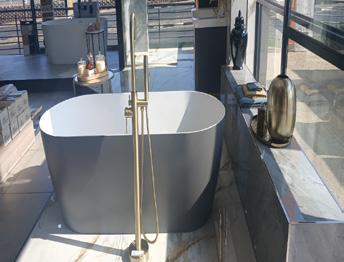

At our home or office, your home or office is our top priority. That's why we offer expert advice DIY projects to help you achieve the look and feel you want. Whether you're looking to buy tiles need some inspiration, we are here to help. Trust us to guide you through the entire process and the results you want.
So why wait? Create your dream development today with us.
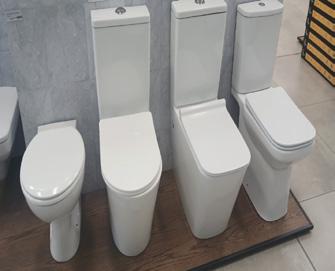
MIYELANI MKHABELA Group Chief executive
purpose is to refresh our country and make it a better place for all
Sustainable solutions through collaboration and co-creation.
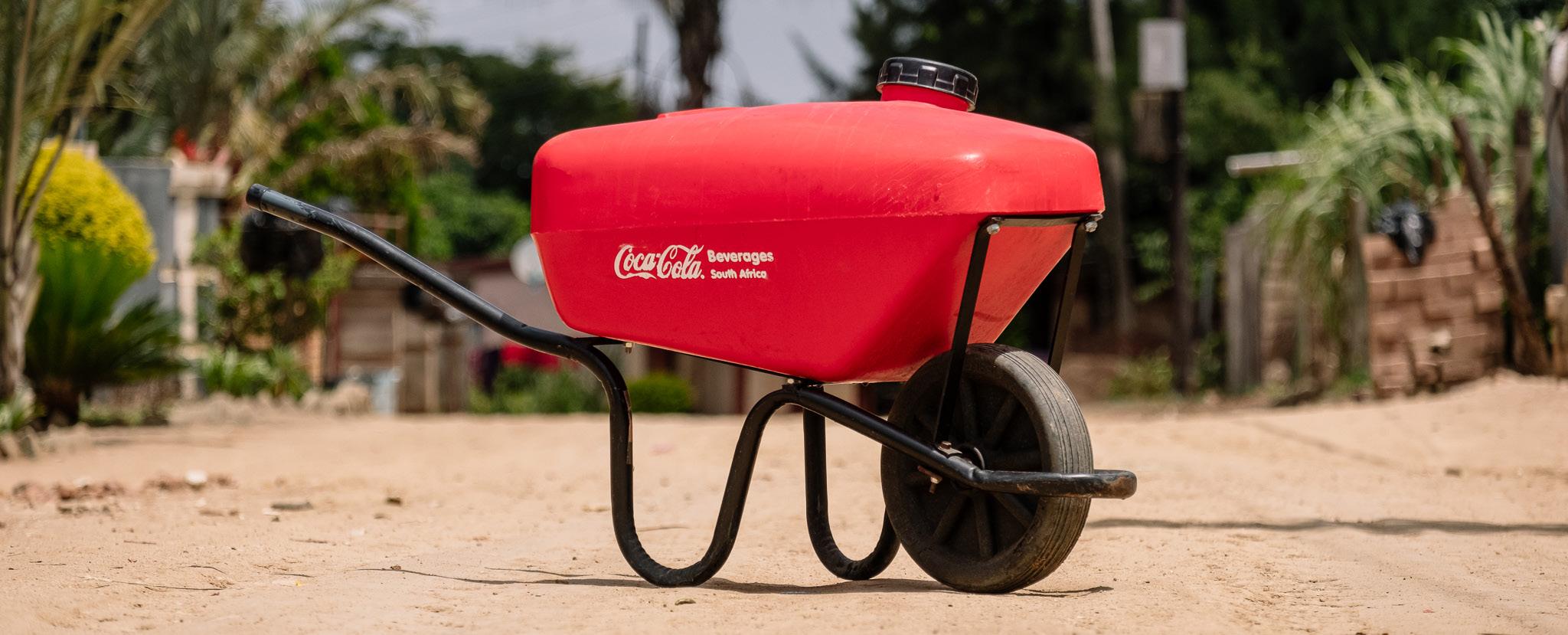
Coca-Cola Beverages South Africa (CCBSA) is a proud industry leader in developing increasingly sustainable ways to manufacture, distribute and sell its products. It uses its industry leadership to be part of the solution to achieve positive change in the world and to build a more sustainable future for the planet.
Its aim is to create greater shared opportunity for the business and the communities the company serves across the value chain. Opportunity is more than just money, it’s about a better future for people and communities everywhere in South Africa.
CCBSA believes in growing its business the right way, not just the easy way. This helps create inclusive growth opportunities for linked communities, women and youth, customers, its employees and shareholders, for a better shared future.
CCBSA is committed to building economic inclusion and sustainability solutions that benefit its stakeholders, in particular, the communities in which the company is invested. It does this through collaboration and co-creation of sustainable solutions.
CCBSA has an important relationship with water. Tell us more...
Water is a priority for the Coca-Cola system because it is essential to life, our beverages and the communities the company serves.
The Coca-Cola Company’s 2030 Water Security Strategy focuses on increasing water security by investing in water initiatives that benefit nature and communities.
This includes projects that provide benefits to local watersheds that supply water for drinking, agriculture and manufacturing, restore and conserve habitats for plants and animals, and offer opportunities for local economic development.
CCBSA is focused on accelerating the actions needed to increase water security where it operates, sources ingredients and touches people’s lives. It does that by contributing toward sustainable, clean water access that improves livelihoods and wellbeing while protecting against water-related disasters.
As part of the Coca-Cola system, it has set three key goals designed to achieve its vision:
• Achieve 100% regenerative water use across our facilities in areas identified as facing high

levels of water stress by 2030
• Improve the health of watersheds identified as most critical for our operations and agricultural supply chain by 2030
• Continue to return water to nature and communities. Ensuring the health of watersheds is a major part of this.
In parts of the Eastern Cape Province in South Africa, CCBSA launched an ambitious project to work with the local municipality and other key stakeholders to assist vulnerable and distressed communities. CCBSA deployed off-grid, solar-powered groundwater harvesting and treatment projects called Cokevilles in the region. Late last year, it unveiled a R12-million groundwater harvesting Cokeville project, to supply the entire town of Graaff Reinet in the Eastern Cape with potable water.
CCBSA seeks to drive a circular economy for its packaging because this helps to reduce waste and carbon emissions.
The company is working to use more recycled content in our packaging, to expand its use of returnable bottles, and to collect packaging for recycling through The Coca-Cola Company’s World Without Waste initiative.
To galvanise collective action, it invests in solutions and partnerships across industry, governments and society. This includes companies within key industry sectors that can help drive the transition to a circular economy.
The Coca-Cola Company and its bottling partners, including Coca-Cola Beverages South Africa, are leading the industry in making our value chain increasingly sustainable in the way that it produces and package its products.
As a system, it has the following global goals:
• Help collect a bottle or can for every one it sells by 2030
• Focus on making all its packaging 100% recyclable by 2025
• Have 50% recycled content in our packaging by 2030
• Make 25% of its packaging reusable (returnable) by 2030
Furthermore, the company is working to use more recycled content in its bottles and has expanded the use of clear and returnable bottles. This includes the introduction and rollout of returnable 2L plastic bottles in South Africa.
According to CCBSA: “People matter. Our planet matters. We believe in doing business the right way by following our values and working toward solutions that benefit us all.” ■


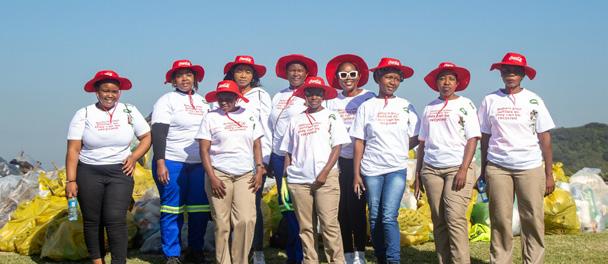
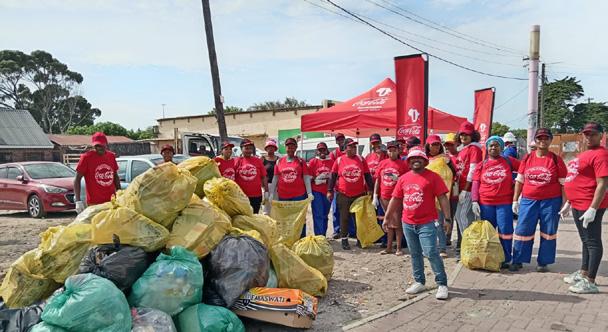
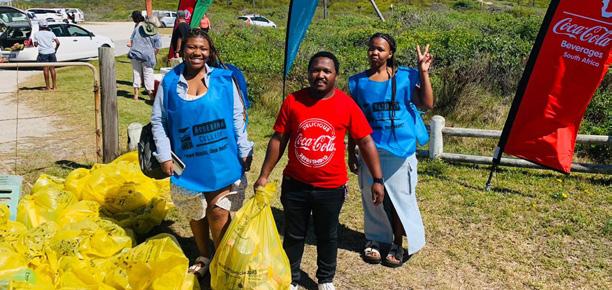
“Together, we co-create solutions that address systemic climate challenges and drive transformative change.” – Dr Shingirirai Savious
Mutanga

Unprecedented environmental challenges have positioned my research group, CSIR Climate Services, as a forerunner of innovation and leadership in climate change research. Our mission transcends mere scientific inquiry; it is a commitment to forging pathways that empower industries across Southern Africa to thrive in a low-carbon, resilient future.
At the core of our vision lies the transformative power of knowledge. Through advanced modelling and cutting-edge decision-support tools, we empower stakeholders to navigate complex climate landscapes with precision and foresight. By delivering actionable insights, we enable proactive adaptation strategies that not only mitigate risks but also foster sustainable growth and resilience in the face of climate uncertainty.
By developing transparent greenhouse gases (GHG) inventories and robust carbon-modelling frameworks, we enable businesses and governments to pioneer carbon-neutral strategies and meet global sustainability standards. Our focus on co-benefits ensures that every action taken contributes not only to environmental sustainability but also to enhancing livelihoods and fostering inclusive growth. Twinned with the Climate Modelling Research Group, which provides seamless projections and downscaling of
future climate through seasonal and near-term time scales, we can build climate risk resilience across all sectors of the economy.
We partner with industry leaders, policymakers and academia to harness collective expertise and resources. Together, we co-create solutions that address systemic climate challenges and drive transformative change. Our global engagements through platforms like COP28 and regional alliances within BRICS and SADC amplify our impact, positioning us at the forefront of shaping sustainable development agendas.
As pioneers in climate services, we catalyse critical mass. Through initiatives like the water-energy-food nexus and landscape restoration, we champion nature-based solutions that enhance resilience and preserve biodiversity. Our robust monitoring and reporting frameworks ensure accountability and drive continuous improvement, aligning with global commitments such as the Paris Agreement.
At the CSIR Climate Services Research Group, we lead with purpose and conviction. We are not just envisioning a sustainable future; we are actively shaping it. At the heart of our value proposition lies the ability to translate complex climate data into actionable

intelligence. By enabling proactive adaptation strategies, we empower our partners to build resilience and sustain growth in a changing climate landscape.
Join us in redefining what climate services can achieve – where innovation meets resilience and every decision today secures a prosperous tomorrow for generations to come.
The research group has produced several key outputs, including but not limited to the following:
Project 1: The research group has led the development of a monitoring and evaluation system for multi-hazard early warning systems and losses and damages under the auspice of the Initiative for Climate Action Transparency (ICAT)
Project 2: Business case development for sector job resilience planning in support of Just Transition
Dr Shingirirai Savious Mutanga is the Research Group Leader for the Council for Scientific and Industrial Research’s (CSIR) Climate Services Research Group, responsible for strategic investment goal setting, leadership provision to a multi-disciplinary team and the implementation of the research, development and innovation strategy. He holds a PhD in industrial systems engineering from the University of Pretoria and an MSc in geoinformation science and earth observation for environmental modelling and management, obtained from a consortium of four universities: the University of Southampton in the United Kingdom, Lund University in Sweden, the University of Warsaw in Poland and the International Institute for Geo-Information Science and Earth Observation (ITC) in the Netherlands. His work experience spans the government to the private sector, academic research, think tanks and consulting. He has served on the Special T20 Africa Standing Group for the G20, BRICS and the Southern African Steering Committee, for Future Earth, a subregional investment forum and is a member of the Southern African Vulnerability Assessment Committee. He has published
in South Africa with UK PACT (Mpumalanga)
Project 3: The Third National Communication on Climate Change and South Africa’s Third Biennial Update Report, which were submitted to the UNFCCC
Project 4: Scenario building for future water management in the Limpopo province, South Africa, in collaboration with the University of Limpopo and South African Weather Services (SAWS)
The group also played a key role in South Africa’s Nationally Determined Contributions reports (DFFE) and the latest National Food and Nutrition Security Survey, funded by the Department of Agriculture, Land Reform and Rural Development (DALLRD).
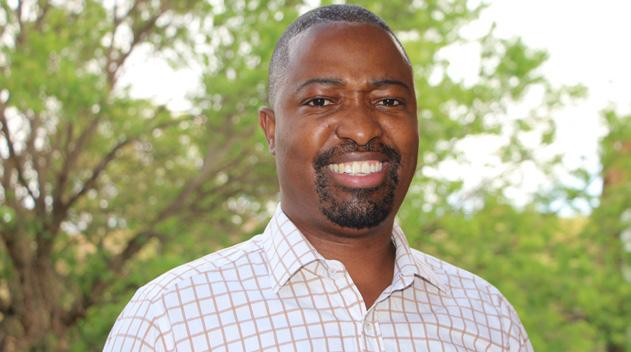
extensively in both national and international accredited journals, policy analysis reports, books and conference proceedings. Among his publications are the edited books Africa in a Changing Global Environment, Management and Mitigation of Acid Mine Drainage (AMD) in South Africa: Input for Mineral Beneficiation in Africa and Africa at Crossroads. His research interest is modelling a wide range of global environmental issues, particularly energy, water, food security and climate change. Within the climate change domain, apart from his technical competence, he has a great interest in advancing climate education. He is a senior research associate with the University of Johannesburg (UJ), the University of the Free State (UFS), the University of Limpopo (UL) and the University of Pretoria (UP), where he is supervising master’s and doctoral students.
Many incentives are available to support small businesses and startups throughout South Africa across a wide range of sectors. Established businesses are also encouraged to support smaller entities along their supply chain.

Funding from the Manufacturing Competitiveness Enhancement Programme (MCEP) helped Glenart Trading move to bigger premises, which has enabled the company to increase Christmas cracker production, among other items, and employ more people.
South Africa wishes to diversify its economy and incentives are an important part of the strategy to attract investors to the country.
The Department of Trade, Industry and Competition (the dtic) is the lead agency in the incentives programme, which aims to encourage local and foreign investment into targeted economic sectors, but the Industrial Development Corporation (IDC) is the most influential funder of projects across South Africa.
There are a variety of incentives available and these incentives can broadly be categorised according to the stage of project development:
• Conceptualisation of the project – including feasibility studies and research and development (grants for R&D and feasibility studies, THRIP, Stp, etc)
• Capital expenditure – involving the creation or expansion of the productive capacity of businesses (MCEP, EIP, CIP, FIG, etc)
• Competitiveness enhancement – involving the introduction of efficiencies and whetting the competitive edge of established companies and commercial or industrial sectors (BBSDP, EMIA, CTCIP, etc)
• Some of the incentives are sector-specific, for example the Aquaculture Development and Enhancement Programme (ADEP), Clothing and Textile Competitiveness Improvement Programme (CTCIP) and the Tourism Support Programme (TSP).
The South African government, particularly the Department of Trade, Industry and Competition, has a range of incentives available to investors, existing companies, entrepreneurs and co-operatives across many sectors.
Key components of the incentive programme are the Manufacturing Incentive Programme (MIP) and the Manufacturing Competitiveness Enhancement Programme (MCEP). The initial MCEP, launched in 2012, was so successful that it was oversubscribed with almost 890 businesses receiving funding.
A second phase of the programme was launched in 2016. The grants are not handouts as the funding covers a maximum of 50% of the cost of the investment, with the remainder to be sourced elsewhere.
The Enterprise Investment Programme (EIP) makes targeted grants to stimulate and promote investment, BEE and employment creation in the manufacturing and tourism sectors. Aimed at smaller companies, the maximum grant is R30-million.
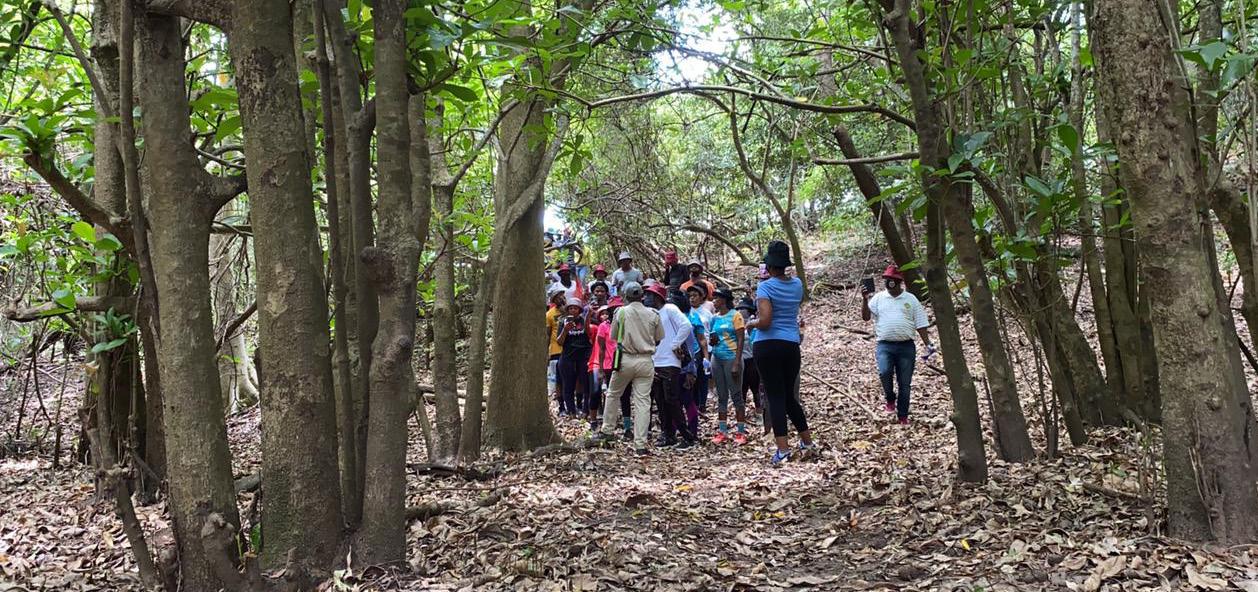
PSN Travel Frenzy is a Richards Bay small business that has grown after being supported by SEDA. Walking tours and game reserve visits are part of the company’s extended tourism offering.
Specific tax deductions are permissible for larger companies investing in the manufacturing sector under Section 12i of the Income Tax Act.
Other incentives available to investors and existing businesses in more than one sector include the:
• Technology and Human Resources for Industry Programme (THRIP)
• Support Programme for Industrial Innovation (SPII)
• Black Business Supplier Development Programme (BBSDP), which is a cost-sharing grant offered to black-owned small enterprises
• Critical Infrastructure Programme (CIP) that covers between 10% and 30% of the total development costs of qualifying infrastructure
• Co-operative Incentive Scheme, which is a 90:10 matching cash grant for registered primary co-operatives
• Sector Specific Assistance Scheme, which is a reimbursable 80:20 cost-sharing grant that can be applied for by export councils, joint action groups and industry associations.
A lot of emphasis is placed on the potential role of small, medium and micro enterprises in job creation and a number of incentives are designed to promote the growth of these businesses. These include:
• Small Medium Enterprise Development Programme (SMEDP)
• Isivande Women’s Fund
• Seda Technology Programme (Stp)
Seda is the Small Enterprise Development Agency an agency of the Department of Small Busine ss Development that exists to promote SMMEs.
The Export Marketing and Investment Assistance (EMIA) Scheme includes support for local businesses that wish to market their businesses internationally to potential importers and investors. The scheme offers financial assistance to South Africans travelling or exhibiting abroad as well as for inbound potential buyers of South African goods. ■
Department of Trade, Industry and Competition: www.thedtic.gov.za
Industrial Development Corporation: www.idc.co.za
Invest Durban: www.invest.durban
Manufacturing Competitiveness Enhancement Programme (MCEP): www.mcep.co.za/
South African government incentive schemes: www.investmentincentives.co.za
Trade & Investment KwaZulu-Natal: www.tikzn.co.za
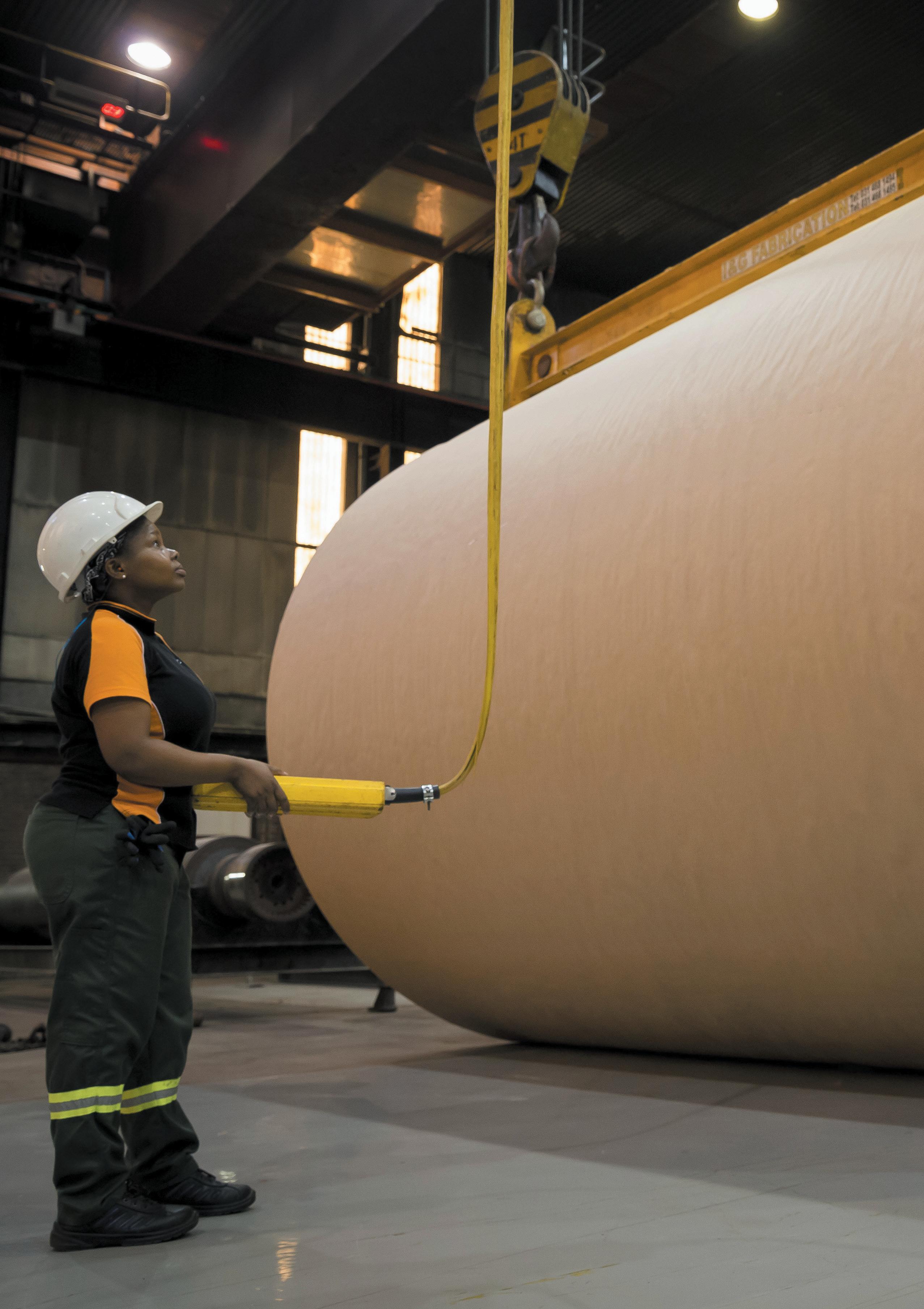
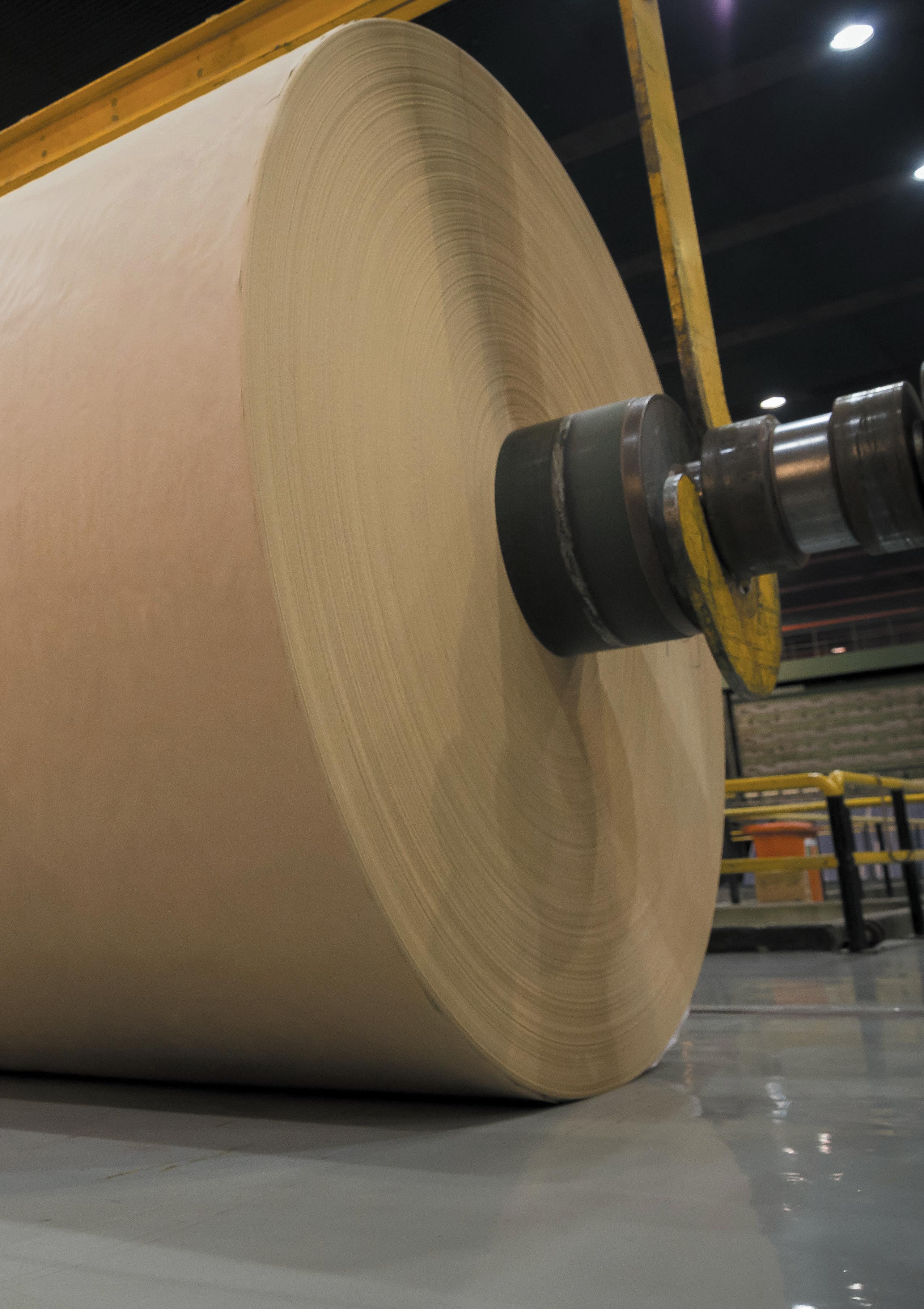
Macadamia nuts are spreading.
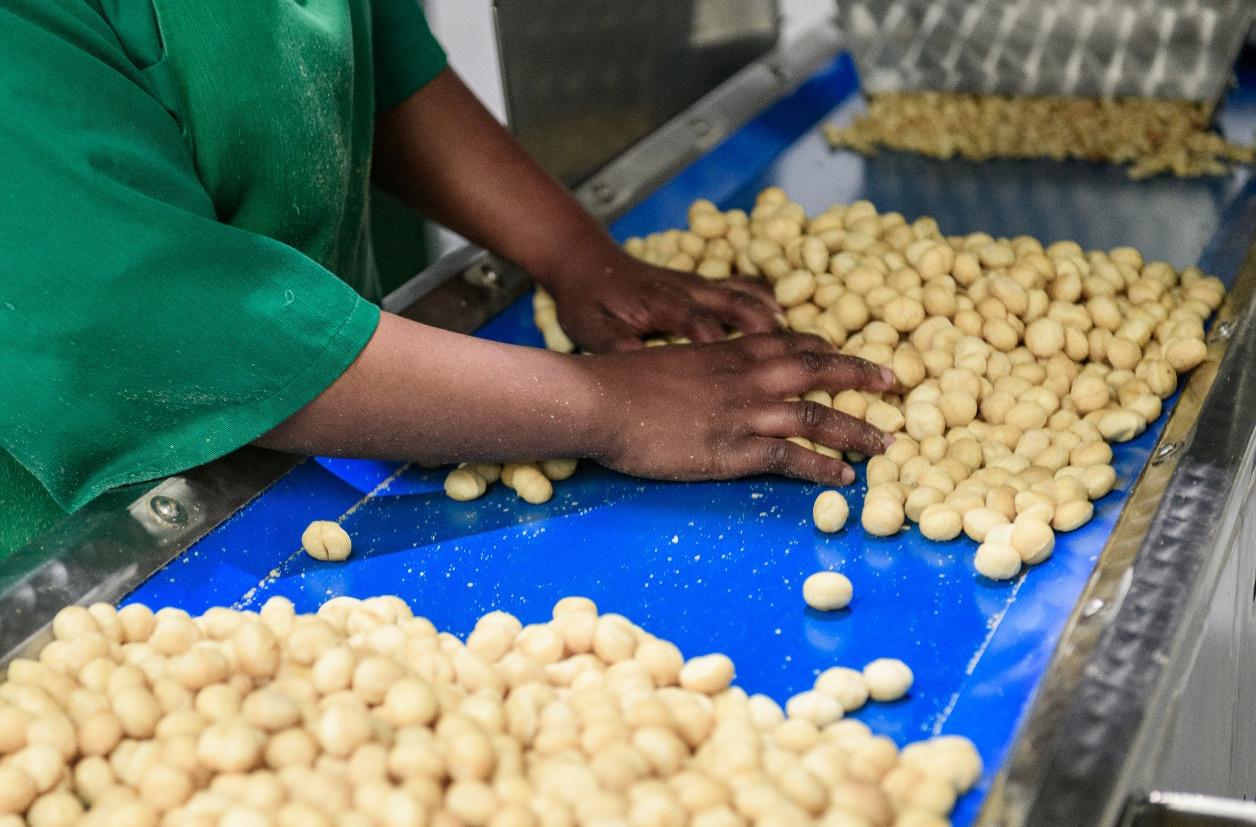
Macadamia nuts have been trending in South Africa for nearly a decade, but the focus has been on the fertile growing areas of Limpopo and Mpumalanga provinces. No longer.
The hot subtropical climate of the KwaZulu-Natal South Coast is perfect for the cultivation of macadamias and farmers in the area are increasingly starting to switch from bananas.
The Kwa-Natal Banana company, which counts among its members farmers responsible for 80% of banana production by volume on the KZN South Coast, reports that most farmers have planted at least part of their farms with macadamias. The chairman of the company, James Miller, has converted half his farm to the nut.
Fertiliser costs for bananas have risen because of Russia’s war with Ukraine and there is increasing competition from countries like Mozambique and Swaziland. Although macadamias are not as labour intensive, they do require a higher level of skill among the workforce.
The global market for macadamias, which is expected to keep growing at an annual compound growth rate of 11.2% to 2032, was valued at R28.7-billion in 2022 (International Nut and Dried Fruit Council).
The South Coast Tourism and Investment Enterprise (SCTIE), with a head office in Port Shepstone, has been formed to attract investment and position the KZN South Coast region as a prime tourism destination.
SECTOR INSIGHT
Tongaat Hulett’s business rescue process continues.
Regarding macadamias, Phelisa Mangcu, CEO of SCTIE, says, “The area is already renowned for its banana production and the growth of the macadamia nut sector is bringing with it job creation and investment opportunities, with the domestic and international export markets primed for these quality-grown products.”
Of KwaZulu-Natal’s 6.5-million hectares of agricultural land, 18% is arable and the balance is suitable for the rearing of livestock. The province’s forests occur mostly in the southern and northern edges of the province.
The coastal areas lend themselves to sugar production and fruit, with the north being particularly well suited to subtropical fruits. KwaZulu-Natal produces 7% of South Africa’s citrus fruit.
The Coastal Farmers Cooperative represents 1 400 farmers. TWK is a R6-billion operation that originated in forestry but which is now a diverse agricultural company with seven operating divisions. It has 19 trade outlets in the province and 21 in Swaziland
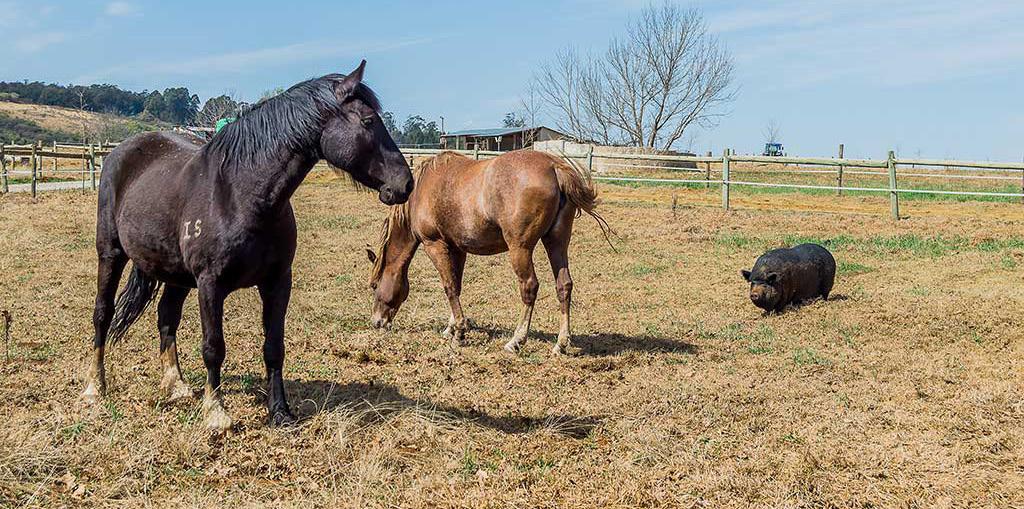
and Mpumalanga.
Beef originates mainly in the Highveld and Midlands areas, with dairy production being undertaken in the Midlands and south. The province produces 18% of South Africa’s milk.
KwaZulu-Natal’s subsistence farmers hold 1.5-million cattle, which represents 55% of the provincial beef herd, and their goat herds account for 74% of the province’s stock.
The Midlands is also home to some of the country’s finest racehorse stud farms. The area around Camperdown is one of the country’s most important areas for pig farming. Vegetables grow well in most areas, and some maize is grown in the north-west.
Enterprise iLembe, the development arm of the iLembe District Municipality, is looking for investors to further develop an agro-processing hub near the King Shaka International Airport and Dube TradePort.
SA Canegrowers Association (SACA) has announced a five-year, R1billion, commitment to the funding of transformation initiatives.
There are approximately 21 000 small-scale farmers in the province, many of whom are involved in programmes with the bigger production companies or are affiliated to SACA. In January 2024, SACA paid out about R175-million for the benefit of smallscale farmers. SA Canegrowers represents 23 866 growers and is responsible for the production of 18.9-million cane tons.
In the same month, the creditors of the troubled Tongaat Hulett Limited agreed to the business rescue plan put forward by the Vision Consortium. With the group’s CFO, Rob Aitken, appointed as interim CEO and a clear plan for the future, hopes were raised that the huge company that has played a major role in sugar industry for more than 100 years would soon be back on its feet. But then an urgent court
Milk Producers Organisation: www.mpo.co.za
SA Canegrowers Association: www.sacanegrowers.co.za
South African Sugar Association: www.sasa.org.za
South Coast Tourism and Investment Enterprise: www.investkznsouthcoast.co.
application was brought against the plan and a court also found that the company was liable for its commitments under the Sugar Act and the Sugar Industry Agreement. This included fees owed to the South African Sugar Association (SASA).
In 2022 seven former Tongaat Hulett senior executives appeared in court on charges of fraud for allegedly backdating sales agreements of the company’s property division to score better bonuses.
The sugar industry itself faces many challenges, not least the imposition of a sugar tax and imports from countries such as Brazil, India and Thailand. Diversification is vital for the future and power generation will be an important part of that. Neither of the Big Two companies relies exclusively on South African sugar earnings: the troubled Tongaat Hulett has a big property portfolio and Illovo draws most of its profit from operations elsewhere in Africa.
A start has been made on tackling the many challenges faced by the sugar industry: the Sugarcane Value Chain Master Plan 2030 has been signed by two national government ministers and various sector participants. Of the 10 443 farmers who supply Tongaat Hulett, 94% are smallscale farmers. The Illovo SmallScale Grower Cane Development Project used 119 local contractors to develop the fields of 1 630 new growers on 3 000ha.
The Sugar Terminal at Maydon Wharf, Durban, serves 11 mills and can store more than half-a-million tons of sugar. It also has a molasses mixing plant. ■
Optimising energy in paper and pulp.
Alot of energy is needed to create paper and pulp and companies are looking for better ways of doing things. Many companies are working to improve efficiencies in their production processes but a focus on steamgeneration efficiencies and optimisation is the speciality of Associated Energy Services (AES), which operates and maintains equipment in the steam and boiler sector.
In the South Durban Basin where there are several large paper companies, emissions regulations put in place by the eThekwini Municipality are having an effect on pollution levels. As Dennis Williams, Commercial Director at AES explains, “The municipality understood that, with an economic incentive, this becomes a selfregulating mechanism. They stipulated that, when applying for licences for new boilers, facilities had to be operated by a specialist energy plant operator.”
AES is investigating the uses to which a range of by-products, pictured, can be put. A particular by-product of the tissue production process, high in both moisture and fibre, has been identified as having energy value.
One of the most important drivers of the packaging industry is the growth of online shopping. Mondi, a global packaging and paper company with a significant presence in KwaZulu-Natal, has released its “Fifth Annual Mondi eCommerce Report”.
Among the findings of this global report are that a quarter of shoppers are buying online at least once a week and fashion is still number one for online purchases. Importantly for packaging companies, 88% of the 6 000 people surveyed said they valued protective packaging and many considered recyclability important. Almost half of the audience said they would not shop again with a brand if the packaging did not meet expectations.
Investments by Mondi into its Richards Bay mill have expanded the number of products that it can offer and also improved environmental outcomes. The two main products are Baycel, a premier grade bleached hardwood pulp made from 100% eucalyptus fibre, and Baywhite, a white top kraft linerboard. Both originate from certified responsibly managed forests. Mondi’s Merebank Mill produces a range of office paper products including the well-known brand, Mondi Rotatrim.
Customers want sustainability in packaging.

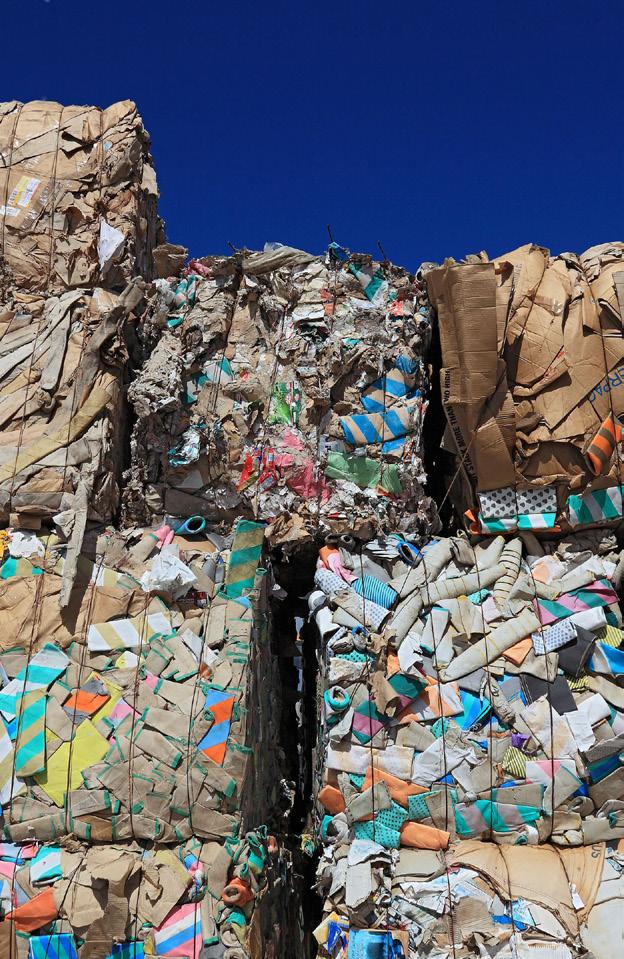
Nampak produces crêpe paper at Verulam and Rafalo produces tissue paper. SA Paper Mills is another paper producer. Mpact has plastics and paper operations and does a lot of recycling.
ONLINE RESOURCES
Forestry South Africa: www.forestry.co.za
Paper Manufacturers Association of South Africa (PAMSA): www.thepaperstory.co.za
South African Institute of Forestry: www.saif.org.za
Sappi has 19 production facilities on three continents. The Sappi Saiccor mill 50km south of Durban is the world’s biggest manufacturer of dissolving wood pulp. Typek office paper is made at Sappi’s Stanger Mill. Sappi Southern Africa has concluded a 175GWh per annum renewable energy Power Purchase Agreement (PPA) with Enpower Trading. ■

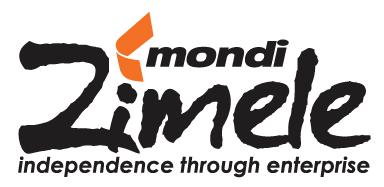
According to Statistics SA’s 2021 report on food security and hunger, out of almost 17,9 million households in South Africa, almost 80% reported inadequate access to food, and 15% and 6% reported inadequate and severe access to food, respectively. The country’s unemployment rate was recorded at 32,9% in the first quarter of 2023, one of the highest unemployment rates in the world. During the COVID-19 pandemic, unemployment peaked at 35,3%.
To alleviate these challenges, in 2020, Mondi Zimele established an Agriculture SMME programmme as part of a broader initiative that provides technical and business support to emerging farmers in communities where Mondi and SiyaQhubeka Forests (SQF) operate in Zululand, northern KwaZulu-Natal.
Mondi Zimele thus supplies farmers with technical farming support, including seedlings in the early stages of the programme, business support and financial management training. The programme has been implemented in Zululand, but expansion to other close-by communities is planned.
Mondi Zimele’s Agricultural SMME Programme has supported 122 farmers, which includes 17 SMMEs constituted by 11 co-operatives and six individual farmers since it was established. Over 1 098 households have benefitted. About 320 permanent and seasonal jobs have been created, and approximately R2 million in revenue has been generated since the programme’s launch.
The critical success factor has been the facilitation of formal markets, with exceptional support from local retailers, fresh produce markets, and a vision of formalising supply partnerships with food manufacturers. All the farmers have grown exponentially and are given equal opportunity to supply some of the biggest retailers in South Africa.

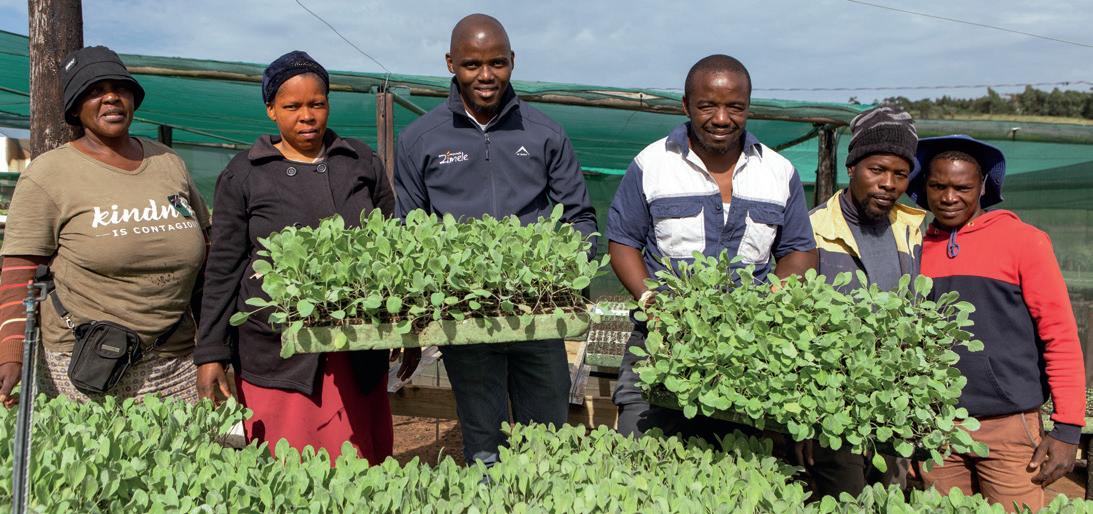
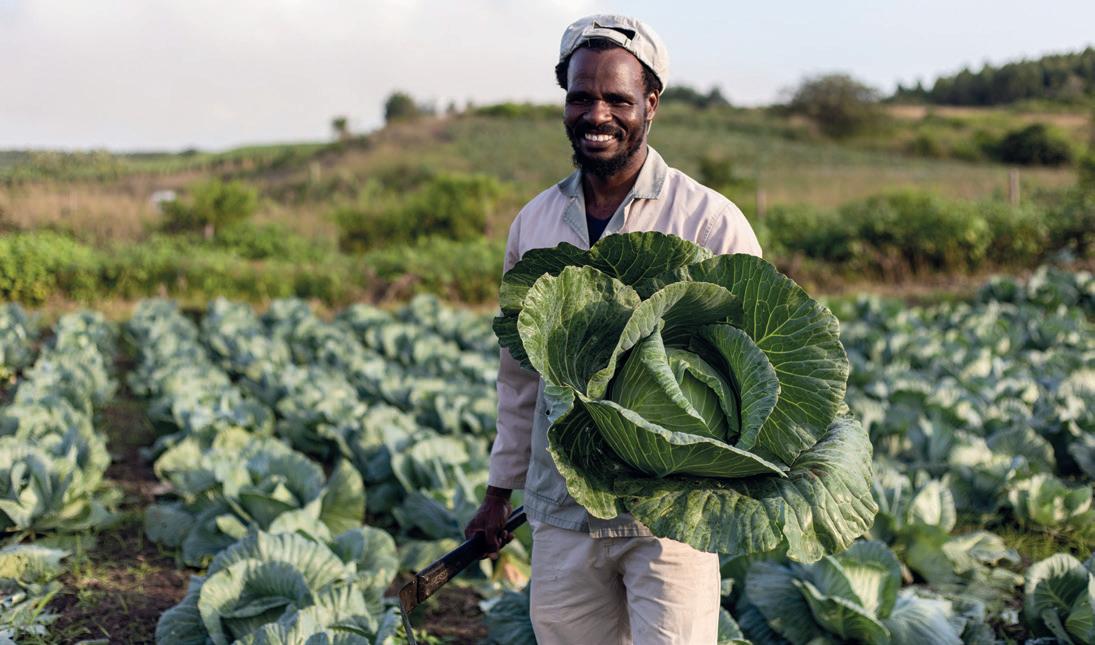
Bongile Bho of Bongile Bho
Trading and Projects said that Mondi Zimele has become like family to her. “My journey wasn’t easy. Mondi Zimele helped me with knowledge to be the independent farmer I am today.”
Bongile began by selling her produce at the local bus stations; now she supplies Spar and Food Lovers Market.
Eva Biyela of Imahlobo Co-

operative in Nzalabantu Reserve said that Mondi Zimele has provided them with business, sales, financial and farming support. “They have been instrumental in teaching us the financial and business side of farming; to record everything that coming in and what’s spent on business needs like chemicals and seeds, so we know how much profit we make individually.”
Mtubatuba-based Lizwi Dube of Ezemvelo Fresh Produce said: “The training sharpened us more than I can express, especially in communicating with retailers and selecting the best produce to send to market. We are supposed to control the market by supplying the best quality in and out of season. Mondi Zimele provides us with the technical know-how.”Dokodweni Farming’s Sifiso Nkwanyana said that Mondi Zimele helped him install a borehole for his farm, which now supplies fresh produce to Spar and Pick ’n Pay.
The Fakude Family owns and runs the Mtolo Farming and Produce in KwaMthethwa. They would like to thank Mondi and Mondi Zimele for extending their possibilities. “Before we started this business, we didn’t have any networking programmes or training. Mondi Zimele helped us when we wanted to expand and obtain necessary information and knowledge to help maintain our business and ensure it supplies what customers need.
Emerging Zululand farmers who want to join can send their proposals, with pictures of their current operations, to their local traditional authority, which sits on the Mondi Liaising Forum. After a comprehensive assessment, the chiefs submit them to Mondi’s Land Department to determine if they are at the subsistence or semicommercial phase. If all criteria are met, Mondi Zimele will get on board and support them accordingly.
Afrimat has acquired Lafarge.

In April 2024 Afrimat’s acquisition of Lafarge finally won the approval of the Competition Tribunal.
Afrimat has been following a diversification strategy in recent years, especially into mining, but the Lafarge transaction is something of a return to its roots, which lie in quarrying and aggregates. Both companies have a strong KwaZulu-Natal presence.
The fly-ash and grinding plants of Lafarge give Afrimat access to more downstream operations while the cement kilns provide another income stream. The assets will be housed within Afrimat’s Construction Materials division.
Although mining has been pursued in South Africa for many years, there are some experts who feel that the country’s potential has only begun to be tapped. In order to provide better and more detailed data about what lies beneath the surface, the Council for Geoscience (CGS) has embarked on a multi-year Integrated and Multidisciplinary Geoscience Mapping Programme (IMMP) of the country.
The process is not only about finding new mineral resources but preliminary findings, especially in the kind of minerals that the world needs to help it switch to cleaner energy processes, have been encouraging and a stated goal is to secure a minimum of 5% of the global exploration expenditure. The multidisciplinary onshore geoscience mapping is being done at 1:50 000 scale and is providing data on groundwater, geo-environmental matters and geohazards. KwaZulu-Natal has had more than its fair share of floods and land washed away in recent times, so the research is relevant.
A project to extend the life-of-mine of an anthracite coal mine in a rural community north of Richards Bay will go ahead after several visits to high courts.
Council for Geoscience: www.geoscience.org.za
National Department of Mineral Resources: www.dmr.gov.za
SECTOR INSIGHT
Detailed mapping is revealing new resources.
Richards Bay Minerals (RBM), a subsidiary of the Rio Tinto Group, has resumed operations at its mineral sands plant and refinery but has not yet committed to continuing to invest in a major mine-life extension. The main products of the RBM mine are zircon, rutile, titania slag, titanium dioxide feedstock and high-purity iron.
Tronox exports titanium ore, zircon and other materials to its pigment plants around the world where titanium dioxide pigment is produced for use in paints, plastics and paper.
The KZN Sands mineral sands operation comprises a central processing complex in Empangeni and the Fairbreeze Mine, which is flagged for an extension project.
Processing facilities in the province include the steel plant owned by Arcelor Mittal in Newcastle. In early 2024 the company announced that it would defer by six months any decision to close the plant. Safal Steel in Cato Manor is South Africa’s only producer of aluminium-zinc coated products. Some of the coalfields of the province have been revived.
Luxembourg-based Traxys Africa runs a high-carbon ferrochrome plant at Richards Bay. ■
The Central Energy Fund has bought the SAPREF Refinery.
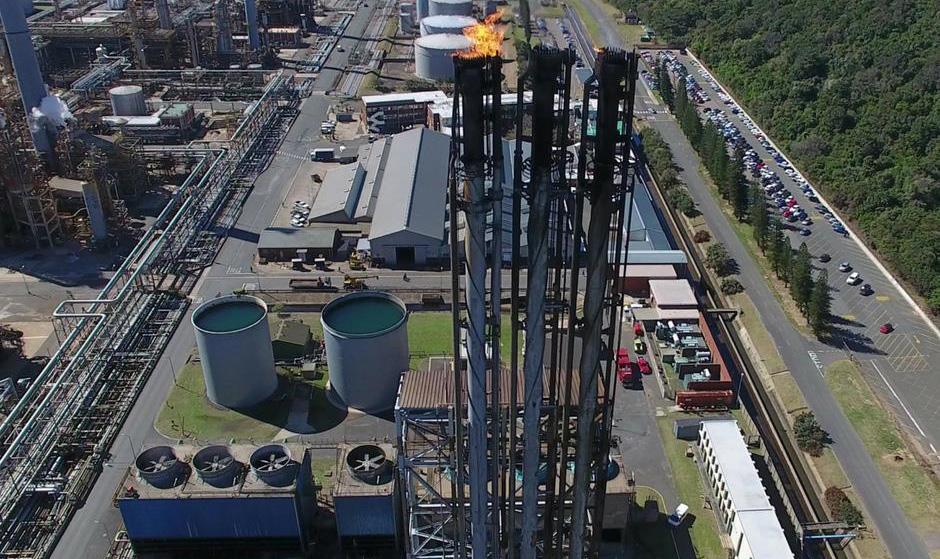
The joint owners of the SAPREF Refinery in Durban, pictured, bp Southern Africa (bpSA) and Shell Downstream SA, have sold the 180 000 barrel-a-day plant to the Central Energy Fund (CEF).
Since the companies announced in 2022 that they would freeze spending and suspend operations, speculation has circulated as to what would happen to this strategic asset. The reported price paid by the CEF, the entity charged with managing South Africa’s energy assets and which reports to the Department of Mineral Resources and Energy (DMRE), was R1. When it was operating at full capacity, the facility accounted for roughly 35% of the country’s refinery capacity.
Durban’s other oil refinery, Enref, was hit by a fire in December 2020 and it has since been operating as a storage facility for owner Engen. South Africa is a net importer of fuel and the Port of Durban handles 80% of South Africa’s fuel imports. In April 2024, the Competition Tribunal approved a proposed a merger whereby Vitol Emerald Bidco intends to acquire Engen, subject to a set of competition and public interest conditions. Among Vitol’s assets is the Burgan Cape Terminal, a storage and distribution facility in Cape Town
The National Energy Regulator of South Africa (Nersa) has approved an application from national utility Eskom to build a 3 000MW gas power station in Richards Bay.
An allocation of 3 126MW to natural gas has been made in the national medium-term energy policy to 2030. The DMRE allocated one of the first two gas-to-power plants to be constructed under the
Central Energy Fund: www.cefgroup.co.za
National Energy Regulator of South Africa: www.nersa.org.za Petroleum Agency SA: www.petroleumagencysa.com
Richards Bay is set to become an energy hub.
Independent Power Producer Procurement Programme (IPPPP) to Richards Bay. This has the potential to turn the Richards Bay Industrial Development Zone (RBIDZ) into an energy hub.
Environmental groups have lodged appeals in an attempt to stop the building of the plant, which is a step along the pathway outlined by national government to use gas as a “transitional fuel”, away from fossil fuels towards greener sources of power.
The Port of Richards Bay is investing in new infrastructure. The supply of liquid petroleum gas (LPG) is set to be made much easier and more reliable with the erection of the 22 600-ton Mounded LPG Facility at Richards Bay.
The regulator and promoter of oil and gas exploration in South Africa, Petroleum Agency South Africa (PASA), has awarded coalbedmethane gas exploration rights in KwaZulu-Natal to NT Energy Africa, which has a partnership with the CEF. These awards are for onshore exploration. PASA is an agency of the DMRE
Eni, one of the world’s biggest energy companies, has an agreement with Sasol Petroleum International to explore for hydrocarbons off the coast of KwaZulu-Natal. ■
Big manufacturers are going off-grid.
Toyota South Africa plans to spend about R800-million in a drive to convert its Durban manufacturing plant to renewable energy.
The company’s Hino truck plant within the Prospecton complex south of the Port of Durban is already running on renewables, part of the 10MW of solar power that is currently powering the vehicle manufacturer’s operations. The plan is to take that up to 31MW, find better ways to dispose of waste and to introduce more low-carbon equipment into the production line, all in pursuit of the goal of having 100% of the plant’s energy supplied by renewables by 2028.
Toyota has been selling hybrids in South Africa for some time, including the Corolla Cross, but in 2025 the company’s first fully electric vehicle, the BZ4X, pictured, will be sold in South Africa. This is part of the global company’s goal to halve emissions by 2035 and become carbon neutral by 2050.
Several alternative-energy options are being considered by the public and private sector to produce additional power. These include using waste heat generated by industry and biomass fuels using waste from forestry and natural gas.
At Donnybrook in the Harry Gwala District Municipality a refurbished Biomass Factory is making various green products and biochar from organic biomass waste streams such as sawdust and bagasse.
A study into using solar energy to provide power for the Sundumbili Water Treatment Works in the iLembe District Municipality was conducted through the Vuthela iLembe LED Support Programme. Funded by the Swiss State Secretariat for Economic Affairs (SECO), the study found that the system, estimated to cost just over R5-million to build, would result in savings of about R4.8-million over a nine-year period.
This study is just one of several initiatives regarding energy taking place within the iLembe District Municipality. Moves to improve the efficiency of the electricity supply to the coastal areas are starting to take shape, but stronger collaboration between the public and private sector is needed to secure reliable power.
Also in the district, an open-cycle gas turbine plant at Shakaskraal can be converted to gas-fired technology, a method which energy planners are encouraging. The 670MW plant came on stream in 2017.
As part of the provincial government’s strategy to boost regional
National Department of Energy: www.energy.gov.za
South African National Energy Development Institute: www.sanedi.org.za
SECTOR INSIGHT
A biomass factory in Donnybrook has 35 employees.
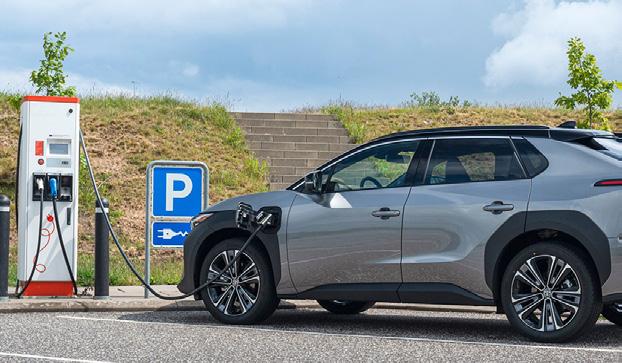
development, the iLembe District has been named as an Industrial Economic Hub (IEH) for the renewable energy sector.
The eThekwini Metropolitan Municipality has entered the field of renewable energy provision with the publication of its eThekwini Integrated Resource Plan (EIRP). This document outlines the steps the city will take towards its cleaner energy goals.
Illovo Sugar SA is keen to produce biofuel and bio-energy and at the company’s Eswatini mill , Ubombo, it has a commercial supply agreement with the Eswatini Electricity Company.
The first project in Eskom’s Battery Energy Storage System (BESS) project was unveiled in KwaZulu-Natal when South Korean company Hyonsung Heavy Industries broke ground at Elandskop in December 2022. The 8MW facility will move to producing an additional 144MW in the second stage of the project. ■
Major projects are underway.
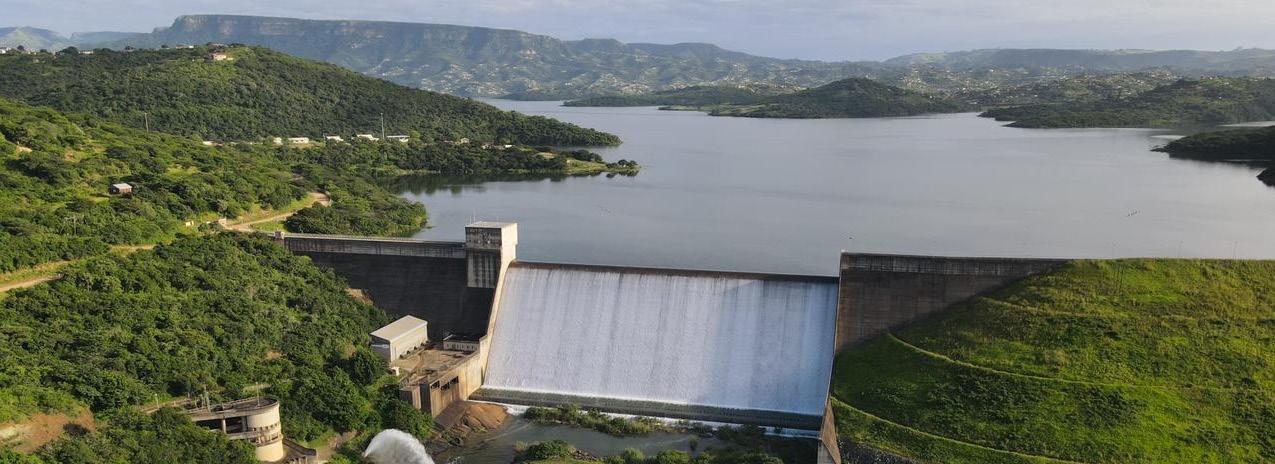
The City of eThekwini and surrounding areas will receive more water as a result of the R28-billion Upper uMkhomazi Water Project. An offtake agreement was signed between various parties in April 2024.
Two state entities are working together to deliver the project, which includes the building of the Upper uMkhomazi Dam, a tunnel from Smithfield Dam and a pipeline connecting the tunnel to the Baynesfield Water Treatment Works. The project will effectively link the under-utilised uMkhomazi River to the existing uMngeni watercatchment area.
The Trans-Caledon Tunnel Authority (TCTA) will implement the raw water component of project and Umgeni Water will be responsible for the bulkwater treatment component for distribution to six water services authorities.
The yield of raw water which will become available in the uMngeni Water System will increase by 55%, once the project is complete.
Work on the multi-year, R250-million Northern Aqueduct Augmentation project continues. As part of the fifth phase of the project, construction of the Canelands pipeline bridge began in 2023. This project comprises water and sewer pipelines and is in response to growing communities in the north, particularly in Wards 58 and 60. The major project was launched in 2014 and is intended to provide water for Durban North, Umhlanga, Newlands, KwaMashu, Phoenix and Cornubia. The main pipeline will supply water from the Durban Heights Treatment Works to the Waterloo, uMhlanga and Blackburn (Cornubia) reservoirs.
In the Harry Gwala District Municipality, an amount of R30-million has been set aside for 28 solar-powered boreholes with elevated
National Department of Water and Sanitation: www.dws.gov.za Umgeni Water: www.umgeni.co.za Water Research Commission: www.wrc.org.za
SECTOR INSIGHT
Construction of the Canelands pipeline bridge has begun.
tankstands to be constructed. In the Umkhanyakude District, Mhlathuze Water has been appointed as the implementing agent to install boreholes across all four local municipalities. The water infrastructure servicing the coastal areas from Southbroom to Port Edward and the inland rural areas will receive more than R40million in upgrades and repairs.
In response to loadshedding, the iLembe District Municipality and two local municipalities, in partnership with the KwaZuluNatal Department of Economic Development and Tourism and funded by the Swiss State Secretariat for Economic Affairs, has conducted a feasibility study into using renewable energy to abstract raw water from the lower Tugela River, treat it to safe drinkable standards and pump it to consumers in the Mandeni and KwaDukuza municipalities.
A provincial Water Intervention Plan is being rolled out in hotspots where municipalities are struggling to provide consistent services. The main pipelines of Kokstad and Underberg are receiving upgrades, as are the water supply systems at Bergville, Skhemelele and Moyeni Zwelisha. ■
Tetra Pak’s upgraded facility is better and bigger.
An investment of more than R500-million has substantially expanded the capacity and range of packaging that Tetra Pak can deliver from its upgraded facility in Pinetown.
In April 2024, President Ramaphosa, pictured, officially reopened the plant, which he said, “aligns with ongoing efforts to rebuild and strengthen the sector”. The two-year project to upgrade the facility supports increased localised production which will allow for quicker delivery of products to market while the introduction of sustainable packaging solutions enhances moves towards a more circular economy.
Aluminium producer Hulamin has experienced tough times but the steps it has taken seem to be paying off. Restructuring included a decision to stop producing three lines of products and to focus less on exports and more on the local market. Beverage cans have been prioritised within the group’s product mix. In 2023 the company had capital expenditure of R311-million and expects to spend another R450-million in 2024. Hulamin had previously laid off some workers and closed one of its factories in another province. Hulamin also makes rolled products at Edendale, Pietermaritzburg and Camps Drift.
South32’s Hillside Aluminium facility in Richards Bay achieved record production in FY 2023. The company’s annual report said that the maximum technical capacity of the smelter was tested, despite the impact of loadshedding, as “an equal record of 540kt in the nine months ended March 2024” was achieved. The FY 2024 guidance is 720kt.
A key component of the economic policies of KwaZulu-Natal and South Africa is the support of Special Economic Zones (SEZs). In addition to its two existing zones, the province wants to establish two new ones.
Leather and textiles will be the focus of the planned SEZs in the Newcastle-Ladysmith corridor, an area where those industries already flourish. The province’s two established zones, Dube TradePort (at King Shaka International Airport) and Richards Bay Industrial Development Zone (RBIDZ) are attracting investments in a range of targeted sectors, agricultural exports and logistics, manufacturing and energy, among others. TradeZone2 at Dube TradePort has been
Aluminium Federation of South Africa: www.afsa.org.za Chemical and Allied Industries’ Association: www.caia.co.za Enterprise iLembe: www.enterpriseilembe.org.za
SECTOR INSIGHT
Hulamin will spend R761-million over two years.
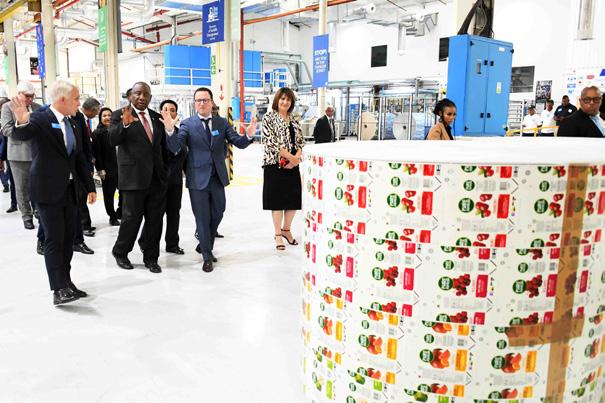
completed and has started attracting investors.
KwaZulu-Natal is the second-largest manufacturing centre in South Africa, contributing 21% to national manufacturing GDP. The strongest export sectors are base metals (32% including aluminium), mineral products such as ores, vehicles and chemical products.
The sector is also a major contributor to the eThekwini Municipality GDP. The city’s economy grew 4.9% in 2021, 73% of which came from manufacturing, finance, business and trade. Over the last five years the municipality established four manufacturing clusters that collectively have over 200 member firms.
Sappi’s massive Saiccor Mill on KwaZulu-Natal’s South Coast is one of the province’s largest processing facilities. ■
The Bell Motor Grader will be made in Richards Bay from 2025.
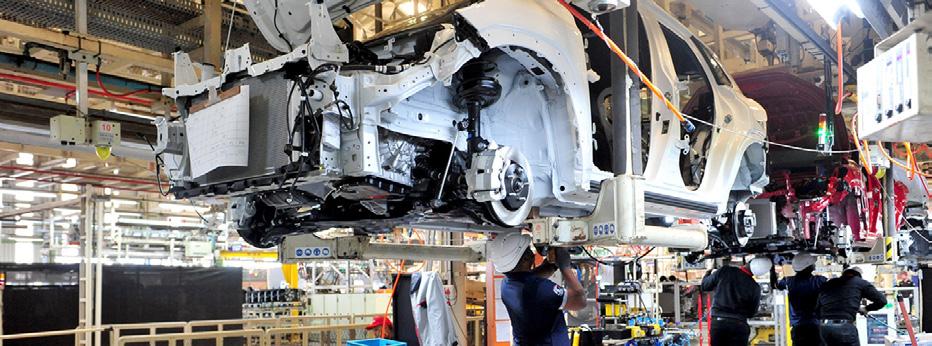
The monumental work that went into cleaning up the Prospecton plant of Toyota South Africa, pictured, after devastating floods has paid off handsomely. In September 2023, the company reported that it achieved national market share in vehicle sales of 27.6%, led by the number-one brands in passenger cars and light commercial vehicles, the Corolla Cross and Hilux.
More than 50% of the 3 249 Hiluxes sold were the double-cab models and 2 259 Corolla Cross vehicles were sold. In addition to the 1.8-million automotive part pieces sent out locally, the company shipped 272 290 pieces to foreign markets. In total, the company sold 142 612 vehicles in 2023, the highest level achieved for sales since 2007.
The company’s total investment of R4.2-billion between 2019 and 2021 included other manufacturing projects and a huge increase in warehousing capabilities.
In 2024, Toyota launched the Associated Accessory Products (AAP), bringing in suppliers such as Ironman 4X4, 4X4 Megaworld, Front Runner, IVXIVBUSHINDABA and Thule to enable customers to add accessories from a Toyota dealership. Accessories available through the AAP programme include roofracks, crossbars, rooftop tents, roof boxes, bike carriers, fridges, recovery boards, solar panels and battery management systems.
As of January 2024, the province’s other large-scale original equipment manufacturer, the Bell Group, had a new CEO. Ashley Bell, grandson of founder Irvine Bell, had previously worked for the company and has been on the board since 2015.
In 2025 the company will start manufacturing the Bell Motor Grader in Richards Bay. A European technology partner and Bell engineers are working on developing a fully battery-operated version
Automotive Industry Development Centre: www.aidc.co.za
Durban Automotive Cluster: www.dbnautocluster.org.za
National Association of Automotive Component and Allied Manufacturers (NAACAM): www.naacam.co.za
SECTOR INSIGHT
In September 2023, Toyota distributed 1.8-million automotive parts locally.
of the popular Bell Articulated Dump Truck (ADT).
Between the Toyota plant and the Richards Bay facility of Bell Equipment, upwards of 11 000 people are employed.
KwaZulu-Natal has a large automotive components sector which includes large manufacturers such as GUD Filters.
In line with the policy of developing Industrial Economic Hubs, the Durban Automotive Supplier Park is planned at Illovo, south of Durban and near to the Toyota manufacturing plant. The Dube TradePort Corporation will manage the project, which covers 1 013ha. Other partners are the eThekwini Municipality, Toyota and the provincial government but the major floods which hit the province in 2022 have slowed progress on the project.
Another manufacturer of earthmoving equipment is at Port Shepstone on the South Coast. Dezzi is part of the Desmond Group of companies that was founded in 1973 and now has 18 offices and branches. The Dezzi CMI backhoe loader is a popular part of the company’s range. ■
New terminal boosts logistics capabilities.
President Cyril Ramaphosa was on hand in April 2024 to celebrate the opening of the Newlyn PX Bayhead Terminal alongside the Port of Durban.
The culmination of an investment pledge at the 2019 South African Investment Conference, logistics specialists Newlyn will spend approximately R3.4-billion on the multimodal facility, mostly with local suppliers. Over 4 000 construction jobs were created and more than 1 000 employees are already working at the facility, a number that is sure to grow as cargo volumes increase.
President Ramaphosa lauded the facility for the role that it will play in the move to “accelerate the movement of cargo from road to rail in line with the objectives of the National Land Transport Framework”. He further stated that the project is a good model of public private partnership as the land is owned by Transnet.
A crucial element also mentioned by the President was how important it is for South Africa to upgrade logistics capacity in order to be benefit from the Africa Continental Free Trade Area (AfCFTA).
The African market of 1.3-billion people is expected to grow to 2.5-billion by 2050 but the key statistic targeted by AfCFTA is intraAfrican trade. Exports to the rest of the world made up between 80% and 90% of Africa’s total trade from 2000 to 2017 (UNCTAD). In 2019 about 27% of South Africa’s exports were delivered to the rest of the continent.
The size of the facility (640 000m² of warehousing, rail sidings and open storage) means that it will be able to receive seven full-block trains of 100 containers each daily.
C Steinweg Bridge, with global headquarters in Rotterdam, and Access World, founded in Italy but now run from Switzerland with operations all over the world, are two foreign investors who have signed up to operate within the Newlyn Terminal.
With two of Africa’s biggest ports in Durban and Richards Bay and the King Shaka International Airport and associated Dube TradePort, KwaZulu-Natal has good infrastructure to support trade and export activity. The N3 highway linking Durban with the Highveld and the industrial hub of South Africa is the country’s busiest road.
Durban harbour is South Africa’s premier multi-cargo port and
Dube TradePort: www.dubetradeport.co.za
South African Association of Freight Forwarders: www.saaff.org.za
Transnet National Ports Authority: www.transnetnationalportsauthority.net
C Steinweg Bridge and Access World are tenants.
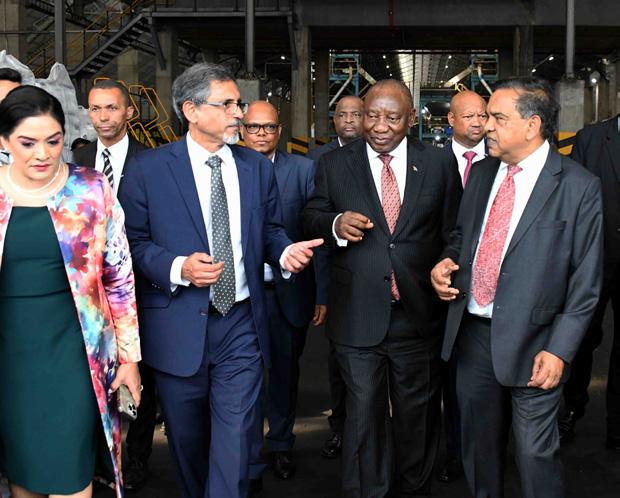
President Ramaphosa is flanked by Minister of Trade, Industry and Competition, Ebrahim Patel, left, and Newlyn CEO Rajendra Balmukhun, at the new terminal facility.
is Africa’s busiest, handling in excess of 80-million tons of cargo per annum (StatsSA).
Dube TradePort has facilities devoted to logistics, warehousing and export support. Proximity to the airport is vital and freight volumes are growing.
King Shaka International Airport has recently been putting out the welcome mat as a number of airlines either return after Covid or put on new routes. Airlines flying in to Durban include Turkish Airlines, Emirates, Qatar Airways, Airlink and FlySafair. ■
PHOTO: GCIS
Cellphone reception is available in the Drakensberg.
The drive to connect South Africans continues. The country’s two biggest cellphone providers, Vodacom and MTN, have set ambitious targets, which includes getting access to signals in some of the most remote regions. In the case of MTN in 2024, this involves 14 new rural sites including Greytown, Tugela Ferry and the Qachas Nek Border Post into Lesotho, pictured.
Vodacom KwaZulu-Natal invested more than R1-billion in the 2023/24 financial year into the region’s network to increase capacity and resilience and accelerate access to connectivity throughout the province. With 23 new urban sites and 129 deep-rural sites coming on stream, Vodacom will take its 4G population coverage above the current level of 95.8%.
A SETA-accredited digital training programme is run in the local municipalities of KwaDukuza and Mandeni. It is managed by the Vuthela iLembe LED Support Programme in partnership with Enterprise iLembe, the district’s economic development agency, the Moses Kotane Institute and the youth managers of both municipalities.
A provincial strategy for creating smart cities is targeting three districts: Ugu (Ray Nkonyeni Local Municipality as anchor), iLembe (KwaDukuza) and Richards Bay (uMhlathuze). Broadband Infraco is providing layer-two network services to Dube TradePort to provide over 810 WiFi hotspots at 405 selected sites across the province.
Over a five-year period, the Moses Kotane Institute, another subsidiary of the KZN Department of Economic Development, Tourism and Environmental Affairs, will connect several rural communities. Hubs are expected to be functional in Community Service Centres to improve public access to digital services.
South African Vanguard of Technology (Savant) is a Department of Trade, Industry and Competition (dtic) programme. It is the marketing and awareness programme for the South African ICT and electronics sector. The aim is to develop South African exports and to attract foreign investment. It houses a venture fund and an incubator.
A SmartXchange SMME Incubator has been launched in Port Shepstone on the South Coast. The concept of ICT has been expanded to include media and electronics, so the hub is called an MICTe Incubator.
Dube TradePort: www.dubetradeport.co.za
SmartExchange: www.smartxchange.co.za
South African Vanguard of Technology: www.savant.co.za
invested R1-billion in 2023/24.

The province’s SmartXchange is an example of a successful publicprivate partnership that supports businesses in the information technology and communications sector. Incubation strategies for startups and skills development (including links to educational institutions) are important parts of the organisation’s brief.
South Africa became better connected to Mauritius, Madagascar and Reunion in 2023 when Liquid Intelligent Technologies South Africa deployed its MTEL T3 subsea cable on Amanzimtoti’s Pipeline Beach. The company will host and manage the submarine cable and provide the fibre-landing facility that will house two subsea cables. ■
SKYE Hotels and Apartments have great views of Umhlanga.
Since 2009, the entrepreneurs who run what is now Coastlands Hotels and Resorts have been investing in property. When the iconic Royal Hotel was added to hotels in Musgrave and Umhlanga in 2015, the portfolio expanded to three properties.
The year 2024 sees a dramatic increase in the number of rooms available within the group with the launch in the Ringside Precinct of Umhlanga of the SKYE Hotel and SKYE Apartments, pictured. The Apartments component has three penthouses while the hotel has 118 all-suite rooms.
When the Elangeni Hotel opened in Durban in 1971 it immediately became a symbol of the province’s leisure industry. In 2012 the hotel was joined to its neighbour, the Maharani, which created a 734-room super-hotel with 11 restaurants and bars. Southern Sun, the current operator of the Elangeni & Maharani Hotel, was the only bidder in March 2024 for the lease for the land which expires in 2025.
Southern Sun runs 13 establishments in KwaZulu-Natal, with Durban (five) and Umhlanga (four), making up the majority.
Hotels are located at each of Tsogo Sun’s three casinos in the province, with two at Suncoast Casino Hotels & Entertainment in Durban. The other two are in Newcastle (Blackrock Hotel) and Pietermaritzburg (Golden Horse Hotel).
Premier Hotels & Resorts has nine properties in the province, including two recently built in Umhlanga on land bought during the Covid-19 pandemic. The group has also restored the Cutty Sark in Scottburgh. The Himeville Arms is located in the tiny village of the same name and a short distance from another Premier property, the Premier Resort Sani Pass. Both could be said to be catering to the Drakensberg traveller.
The International Hotel School in Westville is part of the international group, Sommet Education.
Turkish Airlines has returned to King Shaka International Airport. Two of the airline’s Istanbul-Johannesburg flights now extend to Durban on Thursdays and Saturdays and it has plans to increase these to four weekly flights.
ONLINE RESOURCES
Durban International Convention Centre: www.icc.co.za
Ezemvelo KZN Wildlife: www.kznwildlife.com
Tourism KwaZulu-Natal: www.zulu.org.za
The lease on an iconic beachfront site expires in 2025.
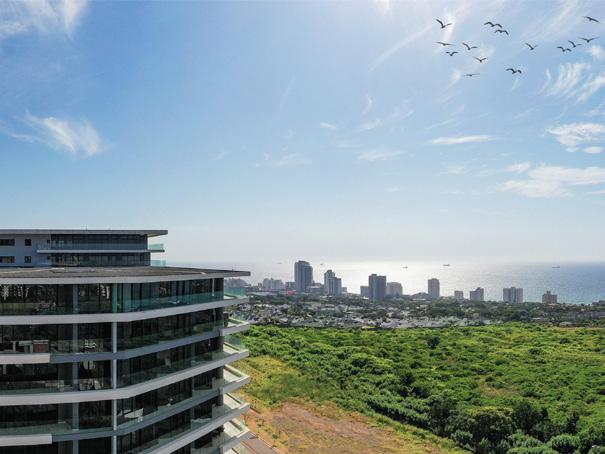
A new direct flight from Durban to Harare in Zimbabwe has been launched by Airlink. These new flights are in addition to Emirates flying five flights a week from Durban directly to Dubai and the four weekly direct flights that Qatar Airways offers.
The project to improve regional airports is continuing. Upgrades at Pietermaritzburg, Newcastle and Richards Bay have been authorised and terminals at Margate and Mkuze, where R72-million was spent, have been completed. Located in the far north of the province, Mkuze holds great potential for the distribution of agricultural produce into the SADC market and for tourism, given its proximity to several private reserves and the iSimangaliso Wetland Park. ■
Coastlands Hotels and Resorts
Dirt will compete with Where’s the Chicken?
Close to 500 submissions were received by the 45th Durban International Film Festival (DIFF) for the 2024 student film programme. From the 478 local and international entries, 21 films were selected to premiere at DIFF and compete for the Best Student Film and Best South African Student Film awards.
Six of the selected films are by South African students, Cloud Line, Dirt, Fisantekraal, Rebooting Memory, Warm and Where’s the Chicken?
Among the many programmes on offer during the DIFF, two of KwaZulu-Natal’s leading cultural professionals will lead masterclasses for a revitalised isiZulu Scriptwriting Masterclass. The focus of the Isiphethu Programme for emerging filmmakers in 2024 is music, marketing, sales and distribution. The Isiphethu International Student Film Festival is open to filmmakers at tertiary institutions.
The Durban International Film festival is presented by the Centre for Creative Arts at the University of KwaZulu-Natal. The first edition of the Durban International Film Festival was held in 1979 and its reputation has been building ever since. In 2023, 3 000 films from 137 countries were viewed over 10 days. A number of prizes are on offer, including Best Feature Film, Best African Feature Film, Best South African Feature Film and Best Documentary.
The Durban Film Office (DFO) has three development programmes targeting filmmakers at different levels in the industry: the Micro Budget Film Fund, Development Fund Grant and the Festivals and Markets Support Grant.
Together, these programmes aim to support intermediate and experienced producers and local emerging filmmakers based in Durban. Also, to provide opportunities for skills development and market access, expose local talent to international audiences and to promote local films.
Celebrating its 20th anniversary in 2023, the DFO has played a pivotal role in positioning Durban as a globally competitive film city.
The KZN Film Industry Transformation Initiative (FITI) is another strategy to support previously disadvantaged and emerging filmmakers. Administered by the KwaZulu-Natal Film Commission, the one-year FITI aims to increase skills levels with a view to individuals being able to advance to senior positions within the industry.
Dube TradePort: www.dubetradeport.co.za
SmartExchange: www.smartxchange.co.za
South African Vanguard of Technology: www.savant.co.za
The Durban Film Office has three development programmes.
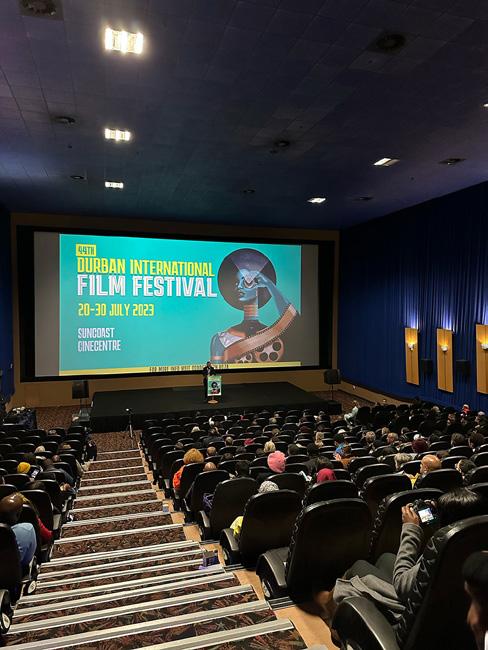
The Durban FilmMart Institute hosts an annual Durban FilmMart that in 2023 attracted 1 018 delegates from 43 countries. The four-day industry event is a finance and co-production market designed to create partnerships and further the development and production of African cinema.
In 2023 it was held under the title of “African Constellations” and featured 28 official projects, seven partner projects and 44 industry sessions. Primary funding is received from the Durban Film Office and the eThekwini Municipality. ■
New technologies are being introduced to classrooms.
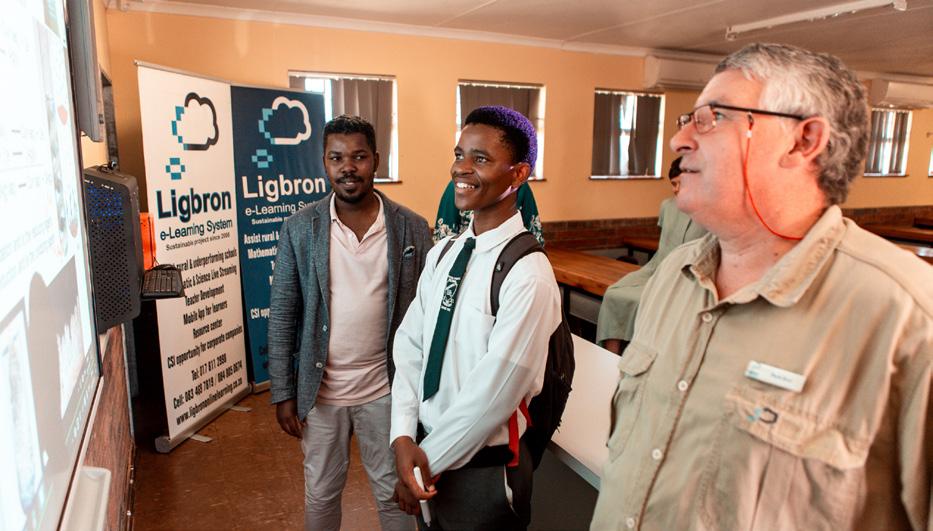
The public and private sectors are putting resources into new technologies and methodologies in the education sector.
Online technology is being deployed to assist with mathematics and science teaching in five rural schools in KwaZulu-Natal. With the financial assistance of packaging and paper company Mondi, the Ligbron e-Learning System has been rolled out since 2017, helping nearly 4 000 pupils. Kwanxusa High School near Melmoth was the first school in the Mondi footprint to receive the infrastructure and software training needed to join the Ligbron e-Learning System and the most recent addition to the programme is Emkhayideni Technical High School near Richards Bay, which was launched in 2023 together with Mondi’s partner, SiyaQhubeka Forests.
The distance-learning project was conceived in 2008 by Frans Kalp, deputy principal of Ligbron Academy. It connects schools all over South Africa to an online learning network, whereby Ligbron coordinates the live streaming of clear, concise mathematics and science lessons to schools that would otherwise not have this access. With those two subjects being important careers in forestry and engineering, Mondi also offers bursaries to academic performers from areas where it has operations.
Two high schools in Verulam have become hotspots for robotics teaching, thanks to a R1.6-million investment by the Shoprite Foundation. Mountview and Verulam Secondary
Schools in Verulam have robotics laboratories and course work has been prepared by SIFISO Edtech, along with robotics kits, teaching material and training. This represents the first phase of a technology initiative which the Foundation is planning to roll out across South Africa.
Microcontrollers, actuators and gyroscopes are among the items that are part of the modular kits that allow pupils to build their own machines. The Shoprite Foundation also donated laptop computers and tablets.
Shoprite’s Class Of initiative supports one pupil in each province to the value of R100 000 in school fees and the supermarket group also runs a bursary programme for students studying accounting, criminology, IT, logistics and supply chain and retail business management. Shoprite also offers these students work experience.
Eleven high schools in the Mondlo/Vryheid area have been given access to a new online learning portal called Lightbulb. In May 2024, the Telkom Foundation and Lightbulb Edtech launched the mobile learning management system and service which has been specially developed to cater for high-school pupils.
The programme, which has been initiated in several other
provinces as well as KwaZulu-Natal, offers a wide choice of subjects in which support is available, including English, Afrikaans, mathematics, natural science, physical science, geography, history and accounting.
In the state sector, an e-learning infrastructure programme was launched at a primary school in the Harry Gwala District. The programme will be rolled out to other rural areas throughout the province. Digital access will allow pupils in remote areas to be connected to the best teachers in the province.
The first school in KwaZulu-Natal to focus exclusively on maths, science and technology opened in 2021 when the Anton Lembede Mathematics, Science and Technology Academy was launched. A three-pathways approach has been adopted for future educational planning. Three broad streams can be followed: academic, technical/ vocational and technical/occupational.
Within that structure, various schools of excellence will be established: an Agricultural School of Excellence in uMgungundlovu District, a Maritime School of Excellence and a School of Autism. More than 200 schools have been earmarked to offer Coding and Robotics as part of the curriculum in Grades 8 and 9. A pilot programme teaching entrepreneurship was piloted in 2021 in the King Cetshwayo District.
KwaZulu-Natal has nine Technical and Vocational Education and Training (TVET) Colleges with a total enrolment of about 80 000.
Coastal KZN TVET College gives students practical experience through facilities such as the Nongalo Industrial Park. The college hosts the Samsung Engineering Academy, a Tooling Centre of Excellence and a manufacturing plant for sanitary towels. The college has several sites on the South Coast and caters for 15 400 students.
Majuba TVET College is a Centre of Specialisation for boilermaking. The Mnambithi TVET College is located in the Battlefields Route tourism area and offers National Diploma courses in tourism, among other qualifications. A satellite campus operates at Estcourt. uMfolozi TVET College runs an Installation, Repair and Maintenance (IRM) Hub in Mandeni.
There are two universities and two universities of technology in KwaZulu-Natal, and the national distance university, the University of South Africa (Unisa), has a presence in five locations. USB Executive Development offers business courses for executives.
KwaZulu-Natal Department of Education: www.kzneducation.gov.za
National Research Foundation: www.nrf.ac.za
National Skills Authority: www.nationalskillsauthority.org.za
uMfolozi TVET College: www.umfolozicollege.co.za

Robotics is in the curriculum in Verulam.
UKZN has close to 40 000 students studying on five campuses in two cities. Greater Durban hosts Howard College, Berea (environment, engineering, law, humanities) and the Nelson Mandela School of Medicine at Congella. The UKZN administration and the Graduate School of Business are based at Westville (also science, engineering and health) whereas the Edgewood, Pinetown, campus focusses on education.
The Pietermaritzburg campus offers a broad academic programme, but it is well known for its fine art, theology and agriculture. UKZN also hosts the National Research Foundation.
The Durban University of Technology (DUT) has six faculties operating in seven campuses in Durban and in the Midlands. DUT is well known for its outstanding graphic-design school and offers one of only two chiropractic programmes in South Africa.
The University of Zululand offers diploma and degree courses on two campuses at Empangeni and Richards Bay. ■
Accelerator programme is reaping rewards.
The SME Accelerator of the Durban Chemicals Cluster ( DCC) is providing advice and market access to small businesses within the sector.
It also runs a series of annual awards with substantial cash prizes, which help to bolster the bottom line, as was the case when Dilex Purification won “Best Environmental Sustainability Solution”. Takalani Rathiyaya, pictured, left, of eThekwini Municipality presented the award to Itu Rangaka, CEO of Dilex Purification. The metropolitan municipality supports the DCC, which has a membership of more than 80 major and emerging chemicals manufacturing concerns.
Kyle Ballard, Head of the DCC Accelerator Programme, notes that there are several benefits for SMMEs in being part of an Accelerator programme, over and above the possibility of winning a cash prize. Having access to other options for capital investment and investment opportunities through accelerators, which can facilitate introductions, will ease the path for many startups. Helping SMMEs connect to customers and new markets is another benefit, as is the mentorship that comes with mixing with seasoned industry professionals, who can also help new entrants understand what the sector needs. The collaborative environment with other small business owners can also spark growth.
Other sector-specific accelerators with the backing of the municipality are the Durban Automotive Cluster, KZN Clothing and Textiles Cluster and eThekwini Furniture Cluster. The intention is to be supporting 2 000 SMMEs by 2025, with 200 new contracts in place with the formal manufacturing sector.
The provincial government’s Sukuma 100 000 surpassed its target by creating 137 000 job opportunities in 2021, with all government departments participating in focussing on opportunities for youth employment. Examples of companies that received support under the project are Gelanison Agric, an agricultural initiative that produces high-value crops using the hydroponic system, and AdNotes, a telecommunications company which is 100% black and youthowned. The company received funding from the KZN Youth Fund
National Department of Small Business Development: www.dsbd.gov.za
SME Fund: www.sasmefund.co.za
Small Enterprise Development Agency: www.seda.co.za
Awards bolster cashflow for small businesses.
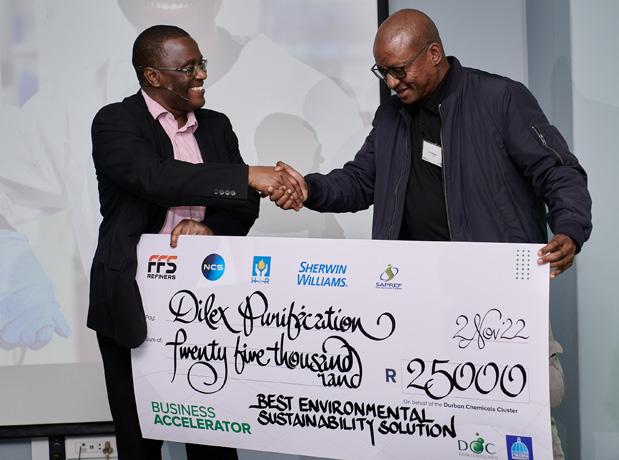
and provides Internet services in the Ugu and King Cetshwayo Districts and eThekwini Metro.
The Small Enterprise Development Agency (Seda) is active in supporting entrepreneurs. Seda gives nonfinancial support through training, assistance with filling in forms, marketing and creating business plans. In KwaZulu-Natal, Seda runs 12 Incubators which either help new businesses get started or with the rehabilitation of existing enterprises. Three models are used: Technology Demonstration Centres (demonstration and training); Technology Incubators (where the focus is rehabilitation); Hybrid Centres, which combine elements of the other two models. The KwaZulu-Natal incubators include ICT and construction (three centres each), furniture and hi-tech (two each) and chemicals and essential oils. ■
Old Mutual is a step closer to starting a bank.
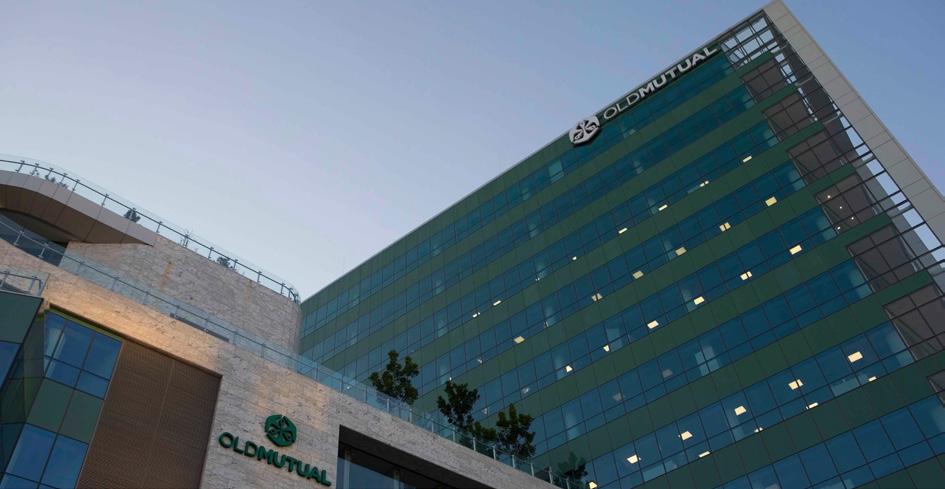
Financial services company Old Mutual has been granted approval by the Prudential Authority to establish a bank, subject to certain licence conditions.
With more than 30 000 employees in 14 countries, Old Mutual is best known for insurance, but it is now on the path to establishing a fully fledged bank. For some time, the group has offered the Money Account, a low-cost transactional account which doubles as a unit trust savings account. This product was offered by Old Mutual Transaction Services in association with Bidvest Bank Ltd and Old Mutual Investment Administrators.
Three other new banks are in the pipeline and have received regulatory approval: the Young Women in Business Network (YWBN) Mutual Bank, Postbank (a state entity) and the SA Innovative Financial Services Cooperative (SAIFSC), which will be run by the Department of Women, Youth and People with Disabilities.
While South Africa’s Big Four – Absa, FirstRand, Nedbank and Standard Bank – continue to play a big role in the banking sector, a feature of the 21st century has been the opening up of the financial services sector, in large measure driven by digital offerings from smaller banks. Capitec was one of the first, followed by Discovery Bank and Zero Bank.
From 2017, a number of new stock exchanges have been established, further evidence of an opening up of what had for many years been a quite static sector. One of the newer
Financial sector diversification is accelerating.
exchanges, A2X, has Aspen and Mr Price, two companies with their headquarters in KwaZulu-Natal, among the entities which have registered secondary listings. Of the four new exchanges that have been established since 2017, ZARX has been suspended and 4AX has rebranded as the Cape Town Stock Exchange. Equity Express Securities Exchange (EESE) trades in Black Economic Empowerment (BEE).
The Brics New Development Bank has made a $200-million loan for the expansion of the container terminal in Durban. Activist groups in Durban’s southern suburbs are opposing the loan and the expansion.
Up the coast at Richards Bay, the World Bank’s International Finance Corporation (IFC) has committed $2-million to a feasibility study on the construction of a liquefied natural gas (LNG) storage and regasification terminal. The study’s costs are shared with Transnet and a private investor will be sought if the feasibility study is positive.
Together with real estate and general business, the financial sector in KwaZuluNatal accounts for 18% of gross domestic product (GDP). ■
A guide to KwaZulu-Natal's municipalities.
KwaZulu-Natal metropolitan and district municipalities.
ETHEKWINI METROPOLITAN MUNICIPALITY
263 Dr Pixley ka Seme Street, Durban 4001
Tel: +27 31 311 1111 | Fax: +27 31 311 2170
uMzimkhulu Municipality
Tel: +27 39 259 5000 | Fax: +27 39 259 0427
Website: www.umzimkhululm.gov.za
Website: www.durban.gov.za
ETHEKWINI METROPOLITAN MUNICIPALITY
AMAJUBA DISTRICT MUNICIPALITY
Durban is the principal city of the province’s only metropolitan municipality.
Postal address: PO Box 1014, Durban 4000
Unit B9356, Ithala Building, Section 1, Main Street, Madadeni Township, Newcastle 2940
ILEMBE DISTRICT MUNICIPALITY
59/61 Mahatma Gandhi St, KwaDukuza 4450
Local municipalities: KwaDukuza Local Municipality; Mandeni Local Municipality; Maphumulo Local Municipality; Ndwedwe Local Municipality
Tel: +27 32 437 9300 | Fax: +27 32 437 9587
Tel: +27 34 329 7200 | Fax: +27 34 314 3785
Physical address: City Hall, 263 Dr Pixley Ka Seme (West) Street, Durban
Website: www.ilembe.gov.za
KING CETSHWAYO DISTRICT MUNICIPALITY
Website: www.amajuba.gov.za
Tel: +27 31 311 1111
Website: www.durban.gov
Dannhauser Municipality
Principal city: Richards Bay
KwaDukuza Municipality
Tel: +27 32 437 5000
Physical address: King Cetshwayo House, Kruger Rand, Richards Bay
Tel: +27 34 621 2666 | Fax: +27 34 621 3114
AMAJUBA DISTRICT MUNICIPALITY
Fax: +27 32 437 5098
Postal address: Private Bag X1025, Richards Bay 3900
Website: www.dannhauser.gov.za
Principal city: Newcastle
Website: www.kwadukuza.gov.za
Tel: +27 35 799 2500
eMadlangeni (Utrecht) Municipality
Physical address: B9356 Amajuba Building, Madadeni
Tel: +27 34 331 3041 | Fax: +27 34 331 4312
Postal address: Private Bag X6615, Newcastle 2940
Website: www.emadlangeni.gov.za
Tel: +27 34 329 7200
Mandeni Municipality
Website: www.kingcetshwayo.gov.za
Tel: +27 32 456 8200
Fax: +27 32 456 2504
Website: www.mandeni.gov.za
Website: www.amajuba.gov.za
Newcastle Municipality
Tel: +27 34 328 7600 | Fax: +27 34 312 1570
Website: www.newcastle.gov.za
Local municipalities: Dannhauser Local Municipality; eMadlangeni Local Municipality; Newcastle Local Municipality
HARRY GWALA DISTRICT MUNICIPALITY
HARRY GWALA DISTRICT MUNICIPALITY
Local municipalities: City of uMhlathuze Local Municipality; Mthonjaneni Local Municipality; Nkandla Local Municipality; uMfolozi Local Municipality; uMlalazi Local Municipality
Maphumulo Municipality
UGU DISTRICT MUNICIPALITY
Tel: +27 32 481 4500
Principal city: Port Shepstone
Fax: +27 32 481 2053
Website: www.maphumuloonline.gov.za
Physical address: 28 Connor Street, Port Shepstone
40 Main Street, Ixopo 3276
Principal city: Ixopo
Tel: +27 39 834 8700
Physical address: 40 Main Street, Ixopo
Fax: +27 39 834 1701
Postal address: Private Bag X501, Ixopo 3276
Postal address: PO Box 33, Port Shepstone 4240
Ndwedwe Municipality
Tel: +27 39 688 5700
Tel: +27 32 532 5000
Website: www.ugu.gov.za
Tel: +27 39 834 8700
Website: www.harrygwaladm.gov.za
Website: www.harrygwaladm.gov.za
Fax: +27 32 532 5031/2
Website: www.ndwedwe.gov.za
Local municipalities: Dr Nkosazana Dlamini
Dr Dlamini Zuma Municipality
Tel: + 27 39 833 1038 | Fax: + 27 39 833 1179
Website: www.ndz.gov.za
Zuma Local Municipality; Greater Kokstad Local Municipality; Ubuhlebezwe Local Municipality; Umzimkhulu Local Municipality
Greater Kokstad Municipality
Local municipalities: Ray Nkonyeni Local Municipality; Umdoni Local Municipality; Umuziwabantu Local Municipality; Umzumbe Local Municipality
KING CETSHWAYO DISTRICT MUNICIPALITY
King Cetshwayo House, Kruger Rand Rd, Richards Bay 3900
UMGUNGUNDLOVU DISTRICT MUNICIPALITY
Tel: +27 35 799 2500
Principal city: Pietermaritzburg
ILEMBE DISTRICT MUNICIPALITY
Tel: +27 39 797 6600 | Fax: +27 39 727 5501
Fax: +27 35 789 1641
Principal city: KwaDukuza
Website: www.kokstad.gov.za
Physical address: iLembe House, 59/61 Mahatma
Website: www.kingcetshwayo.gov.za
Physical address: 242 Langalibalele Street, Pietermaritzburg
Ghandi Street, KwaDukuza
uBuhlebezwe Municipality
City of uMhlathuze Municipality
Postal address: PO Box 3235, Pietermaritzburg 3200
Postal address: PO Box 1788, KwaDukuza 4450
Tel: +27 39 834 7700 | Fax: +27 39 834 1168
Tel: +27 32 437 9300
Website: www.ubuhlebezwe.gov.za
Website: www.ilembe.gov.za
KWAZULU-NATAL BUSINESS 2019/20
Tel: +27 33 897 6700
Tel: +27 35 907 5000 | Fax: +27 35 907 5444
Website: www.umhlathuze.gov.za
Website: www.umdm.gov.za
Local municipalities: Impendle Local
Mthonjaneni Municipality
Tel: +27 35 450 2082 | Fax: +27 35 450 3224
Website: www.mthonjaneni.org.za
Nkandla Municipality
Municipality; Mkhambathini Local Municipality; Mpofana Local Municipality; Msunduzi Local Municipality; Richmond Local Municipality; uMngeni Local Municipality; uMshwathi Local Municipality
Tel: +27 35 833 2000 | Fax: +27 35 833 0920 Website: www.nkandla.org.za
UMKHANYAKUDE DISTRICT MUNICIPALITY
Principal city: Mkuze
uMfolozi Municipality
Physical address: Harlingen No 13433, Kingfisher Road, Mkuze
Tel: +27 35 580 1421 | Fax: +27 35 580 1141 Website: www.umfolozi.gov.za
Postal address: PO Box 449, Mkuze 3965
Tel: +27 35 573 8600
uMlalazi Municipality
Website: www.ukdm.gov.za
Tel: +27 35 473 3300 | Fax: +27 35 474 4733 Website: www.umlalazi.gov.za
Local municipalities: Big 5 Hlabisa Local Municipality; Jozini Local Municipality; Mtubatuba Local Municipality; uMhlabuyalingana Local Municipality
UGU DISTRICT MUNICIPALITY
28 Connor Street, Port Shepstone 4240
UMZINYATHI DISTRICT MUNICIPALITY
Impendle Muncipality
Tel: +27 33 996 6000 | Fax: +27 33 996 0852

Website: www.impendle.gov.za
Website: www.uthukela.gov.za
Tel: +27 39 688 5700 | Fax: +27 39 682 1720
Principal city: Dundee
Website: www.ugu.gov.za
Physical address: 39 Victoria Street, Princess Magogo Building, Dundee
Ray Nkonyeni Municipality
Postal address: PO Box 1965, Dundee 3000
Tel: +27 34 219 1500
Tel: +27 39 688 2000 | Fax: + 27 39 682 0327
Website: www.umzinyathi.gov.za
Web: www.rnm.gov.za
Umdoni Municipality
Local municipalities: Endumeni Local Municipality; Nquthu Local Municipality; uMsinga Local Municipality; Umvoti Local Municipality
Tel: +27 39 978 4313 | Fax: +27 39 976 2020 Website: www.umdoni.gov.za
UTHUKELA DISTRICT MUNICIPALITY
Principal city: Ladysmith
uMuziwabantu Municipality
Physical address: 36 Lyell Street, Ladysmith
Tel: +27 39 433 3500 | Fax: +27 39 433 1208 Website: www.umuziwabantu.gov.za
Postal address: PO Box 116, Ladysmith 3370
Tel: +27 36 638 5100
Umzumbe Municipality
Mkhambathini Municipality
Tel: +27 31 785 9300 | Fax: +27 31 785 2121
Local municipalities: Alfred Duma Local Municipality; Inkosi Langalibalele Local Municipality; Okhahlamba Local Municipality
Website: www.mkhambathini.gov.za
ZULULAND DISTRICT MUNICIPALITY
Mpofana Municipality
Principal city: Ulundi
Tel: +27 33 263 1221 | Fax: +27 33 263 1127
Physical address: 400 Ugagane Street, Ulundi
Website: www.mpofana.gov.za
Postal address: +27 35 874 5500, Private Bag X76, Ulundi 3838
Msunduzi Municipality
Tel: +27 874 5500
Tel: +27 33 392 3000 | Fax: +27 33 345 2397
Website: www.zululand.org.za
Website: www.msunduzi.gov.za
Richmond Municipality
Tel: +27 33 212 2155 | Fax: +27 33 212 2102
Local municipalities: AbaQulusi Local Municipality; eDumbe Local Municipality; Nongoma Local Municipality; Ulundi Local Municipality; uPhongolo Local Municipality
Website: www.richmond.gov.za
